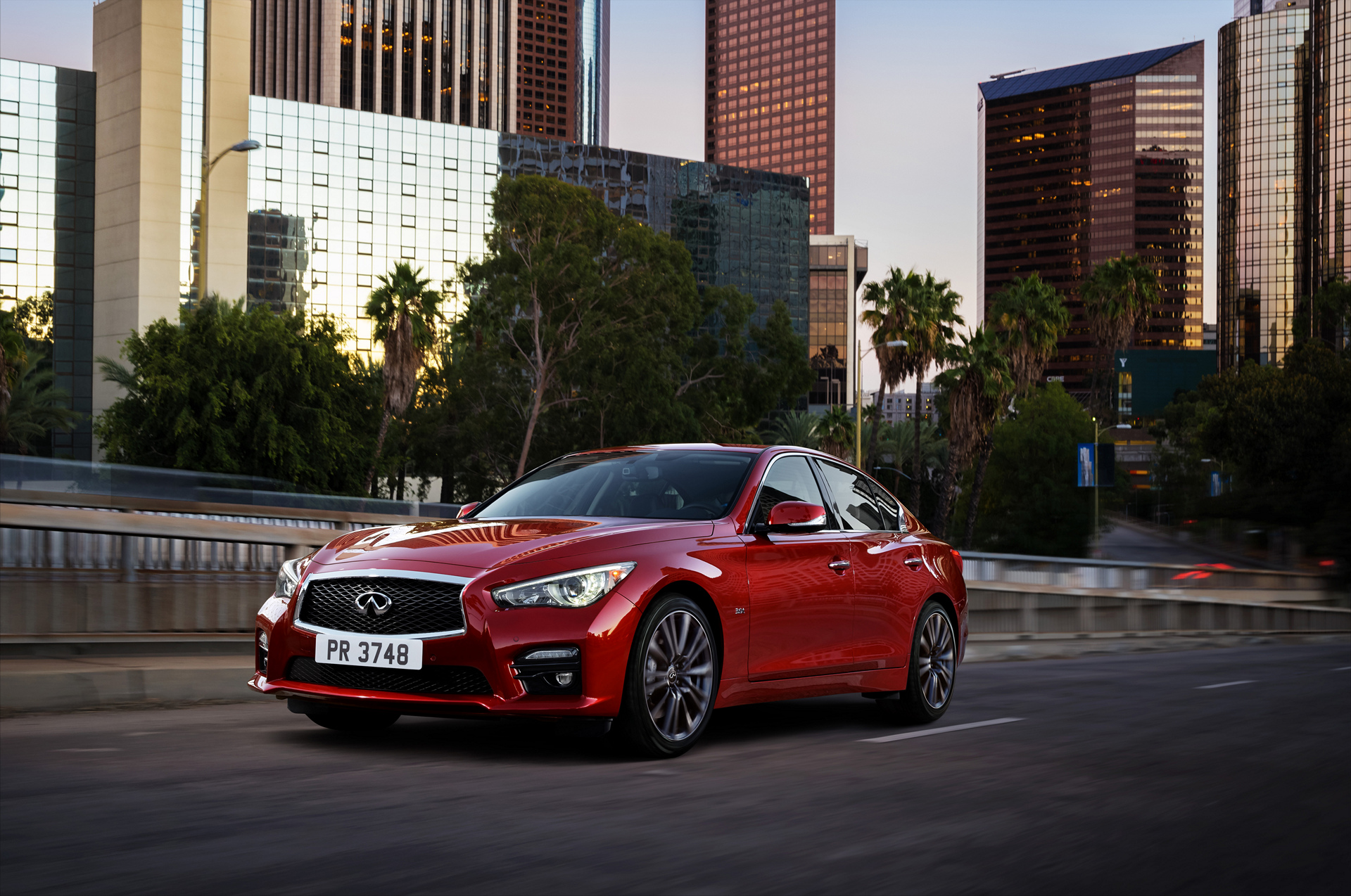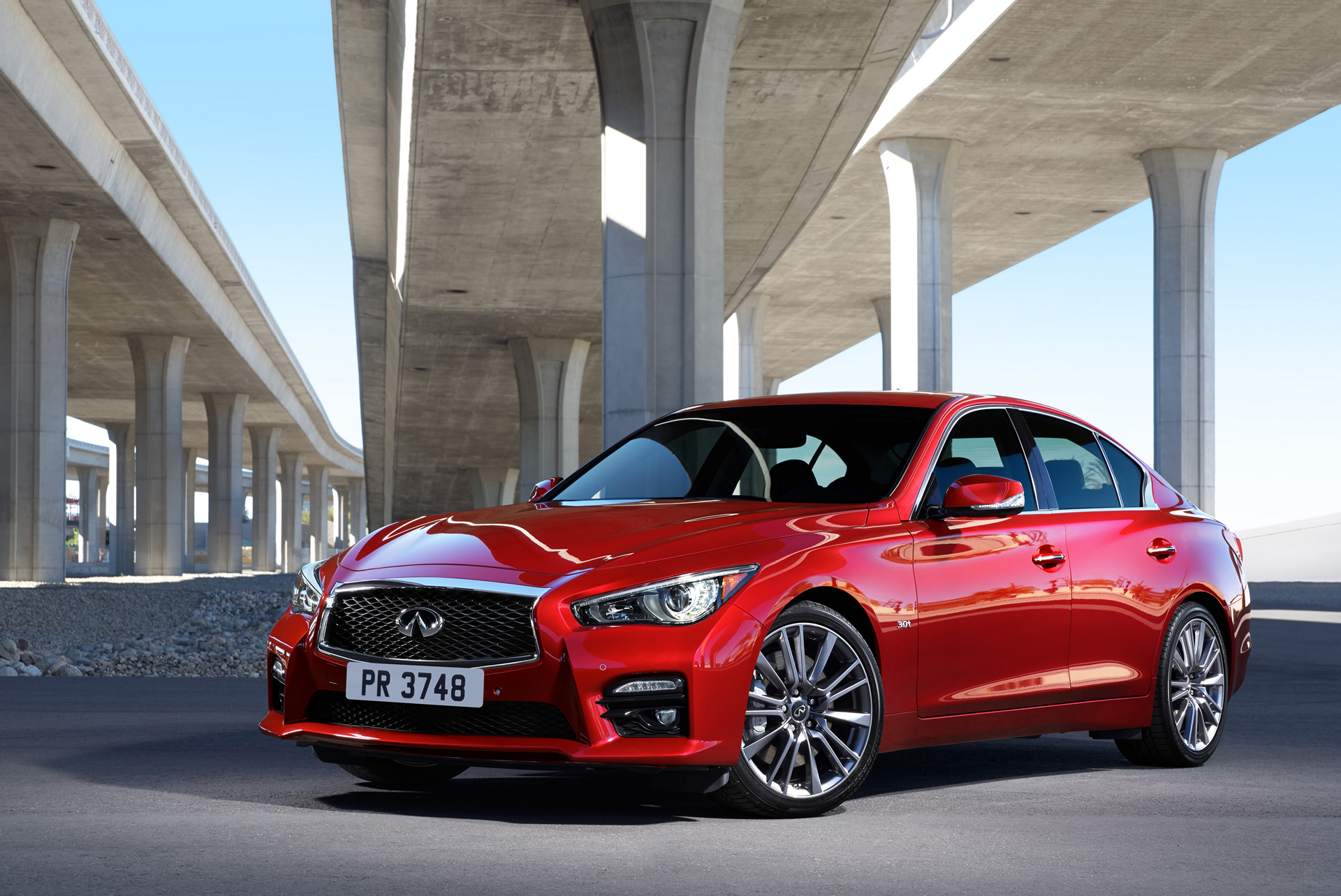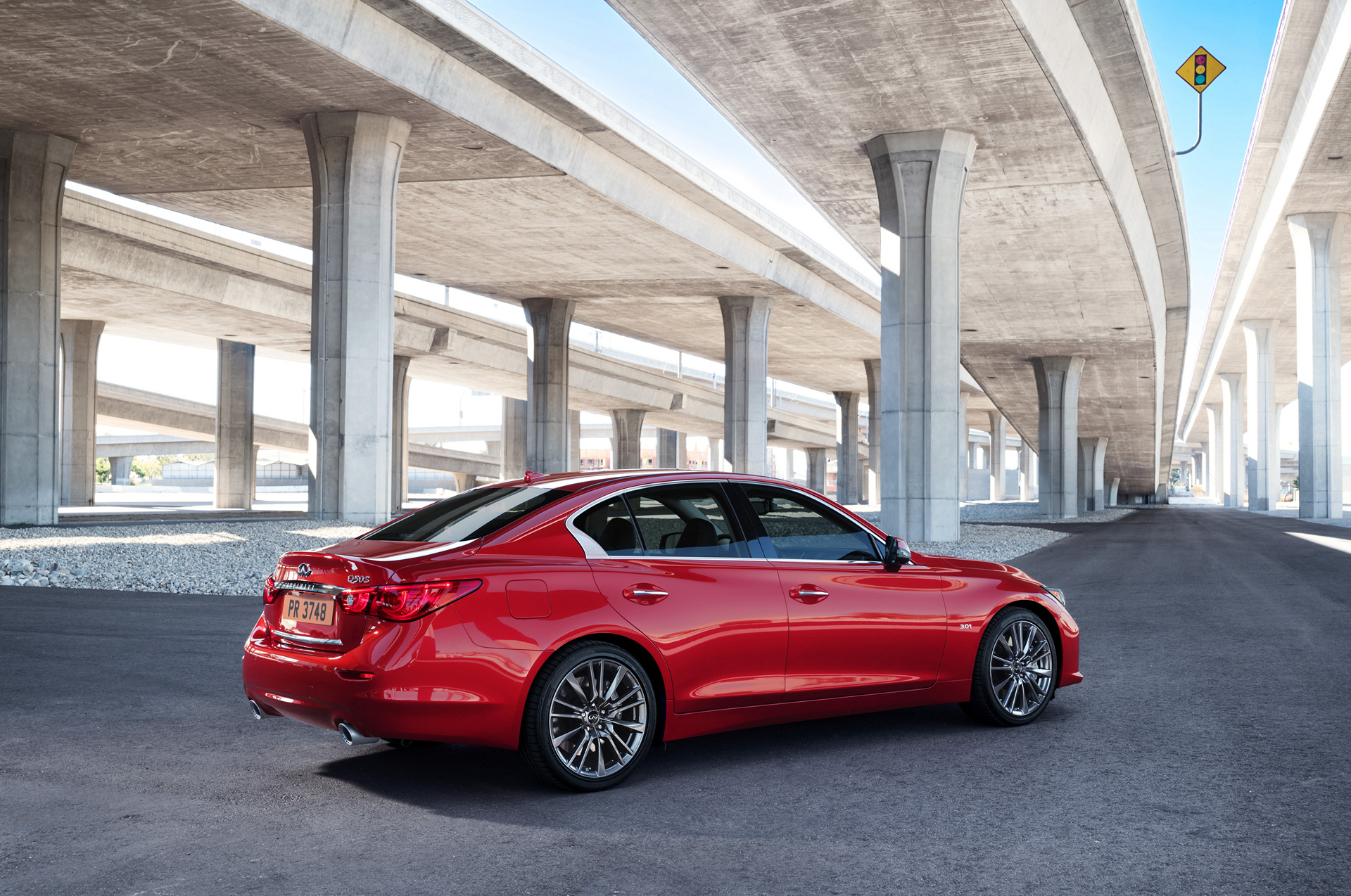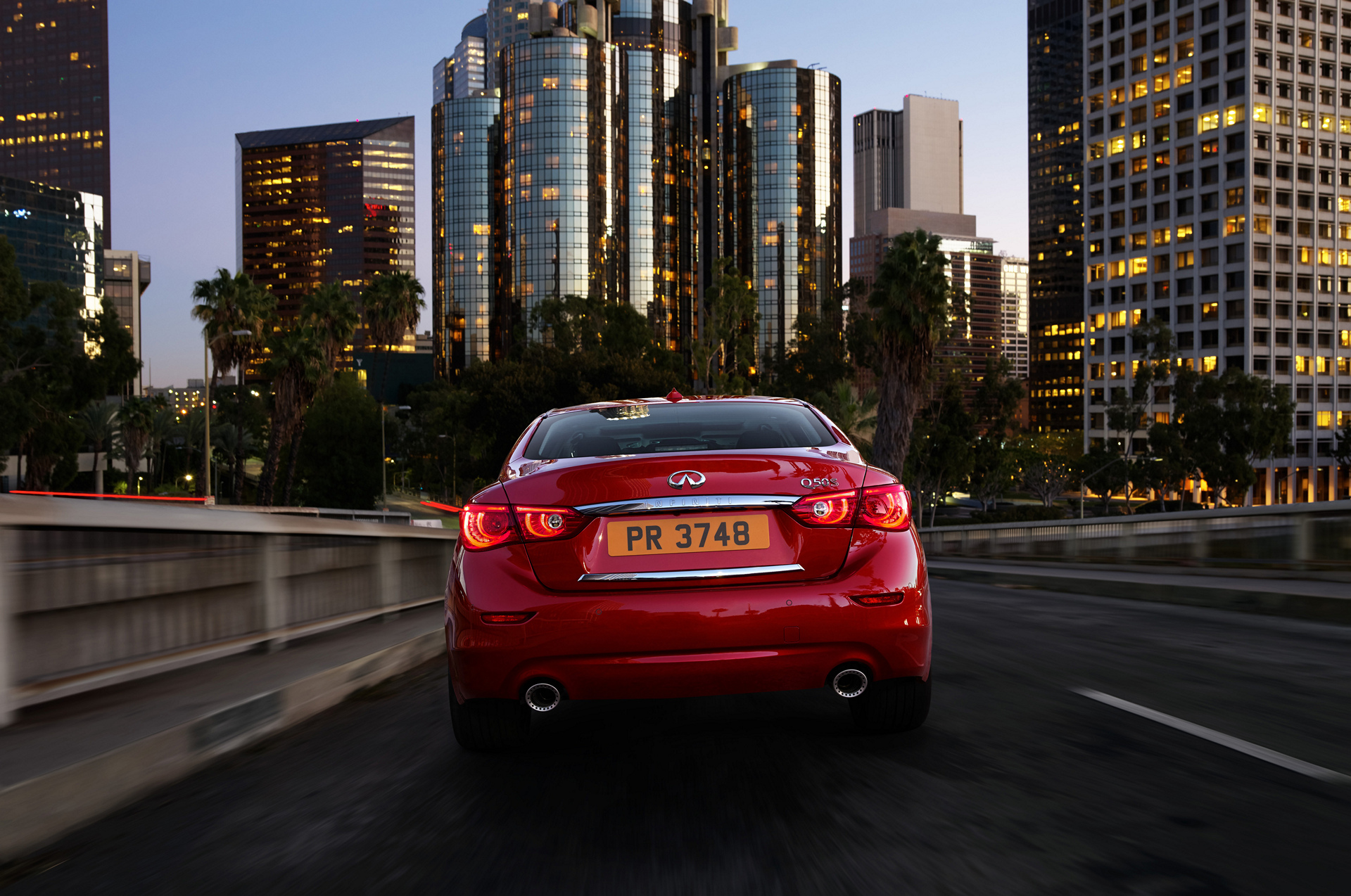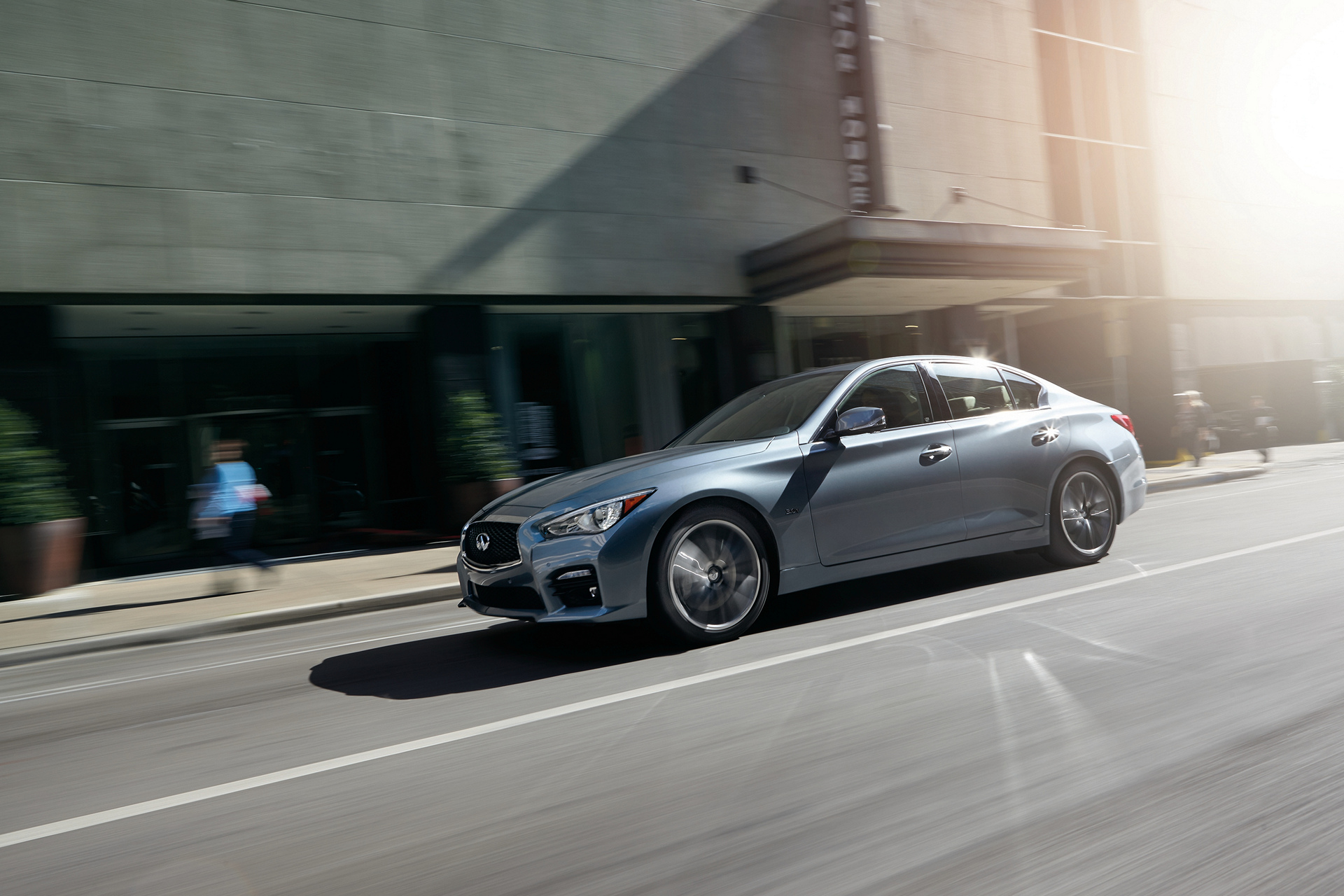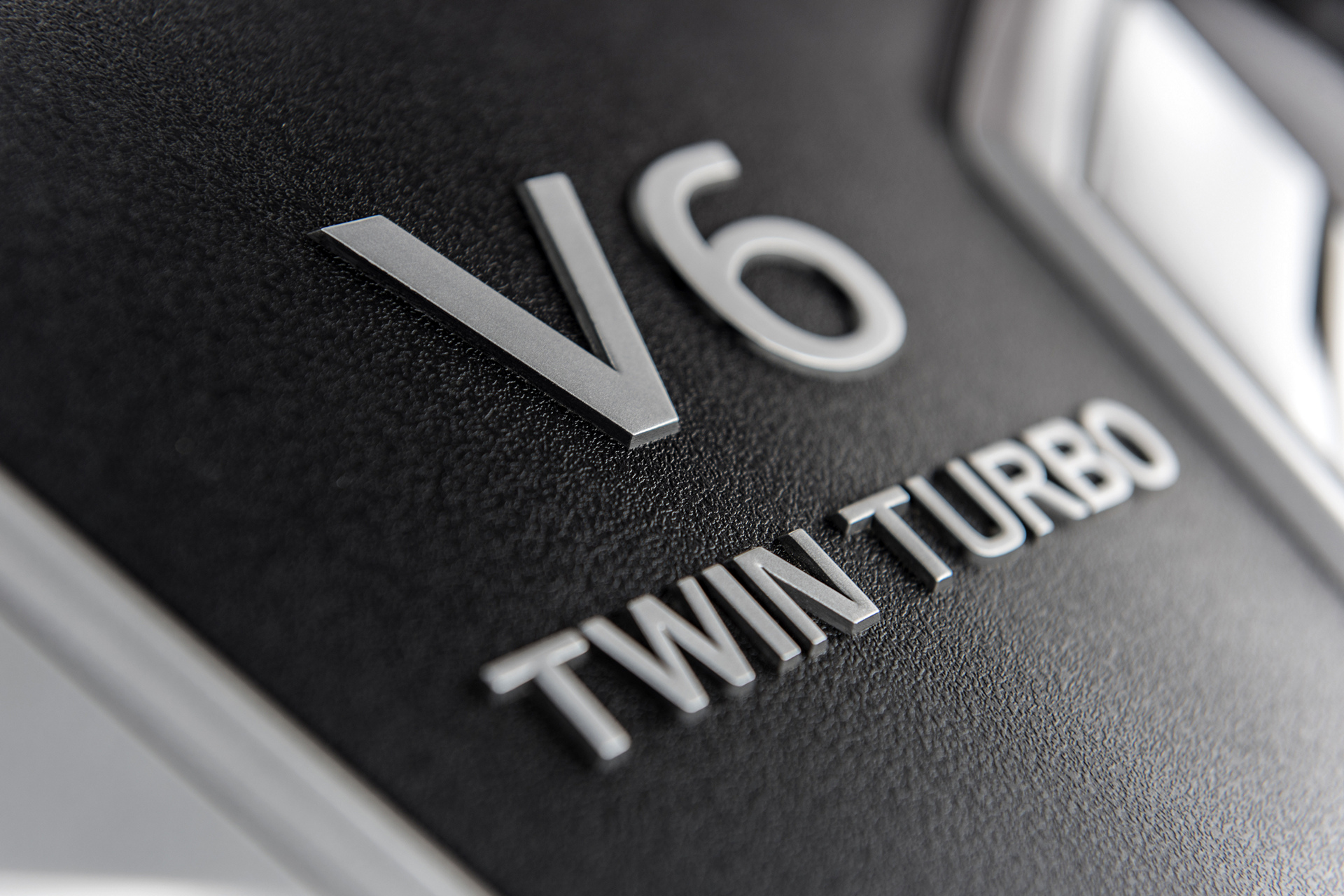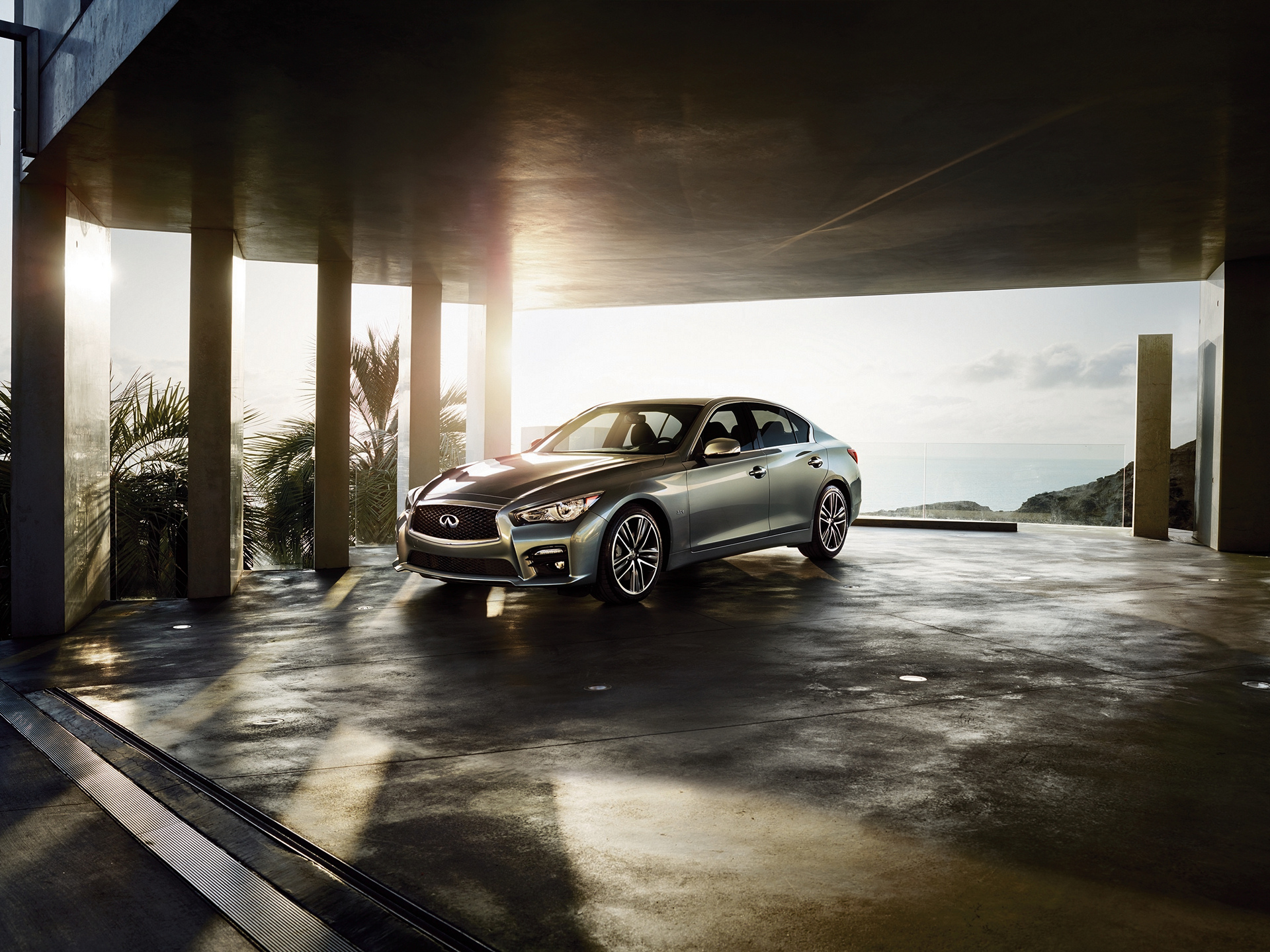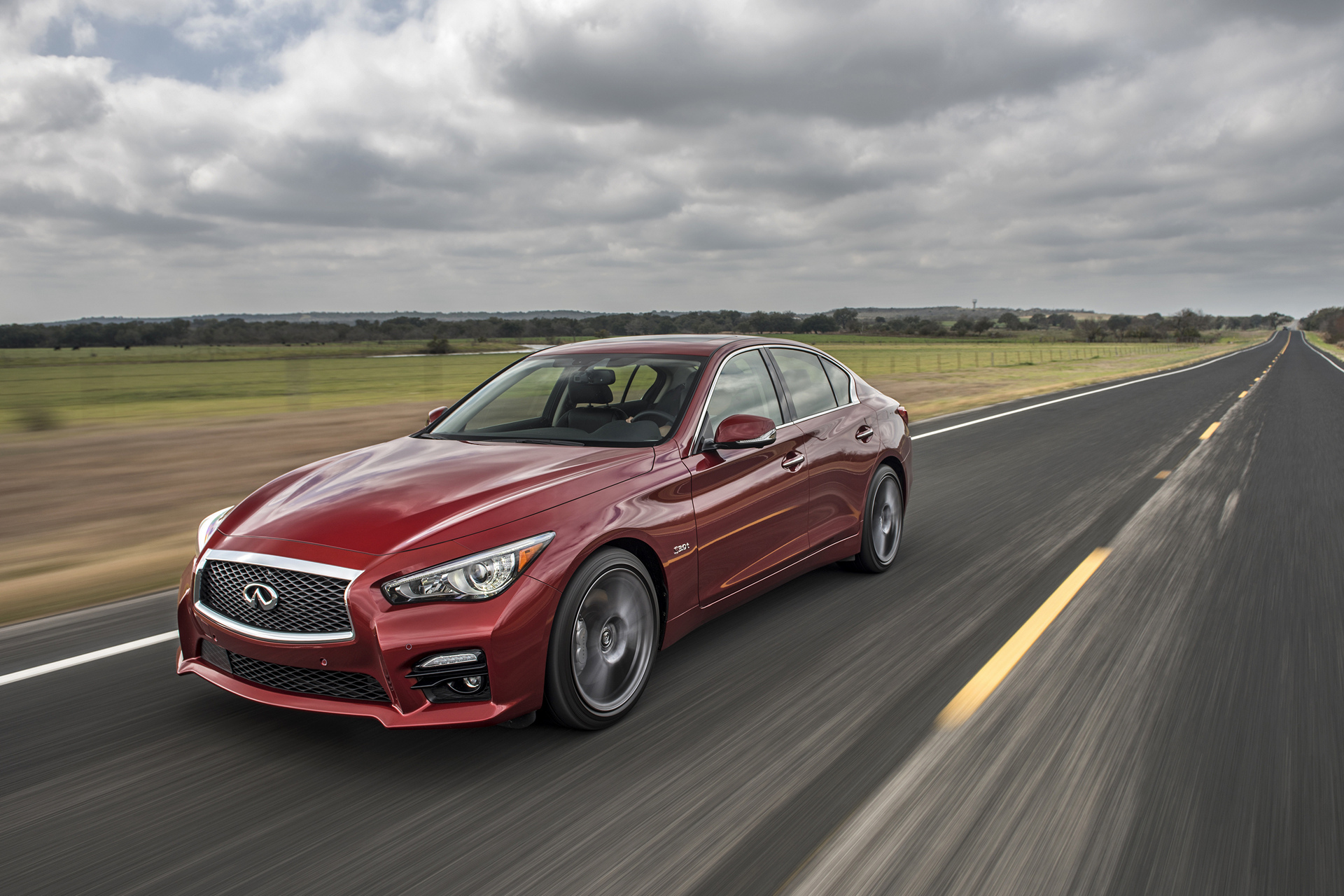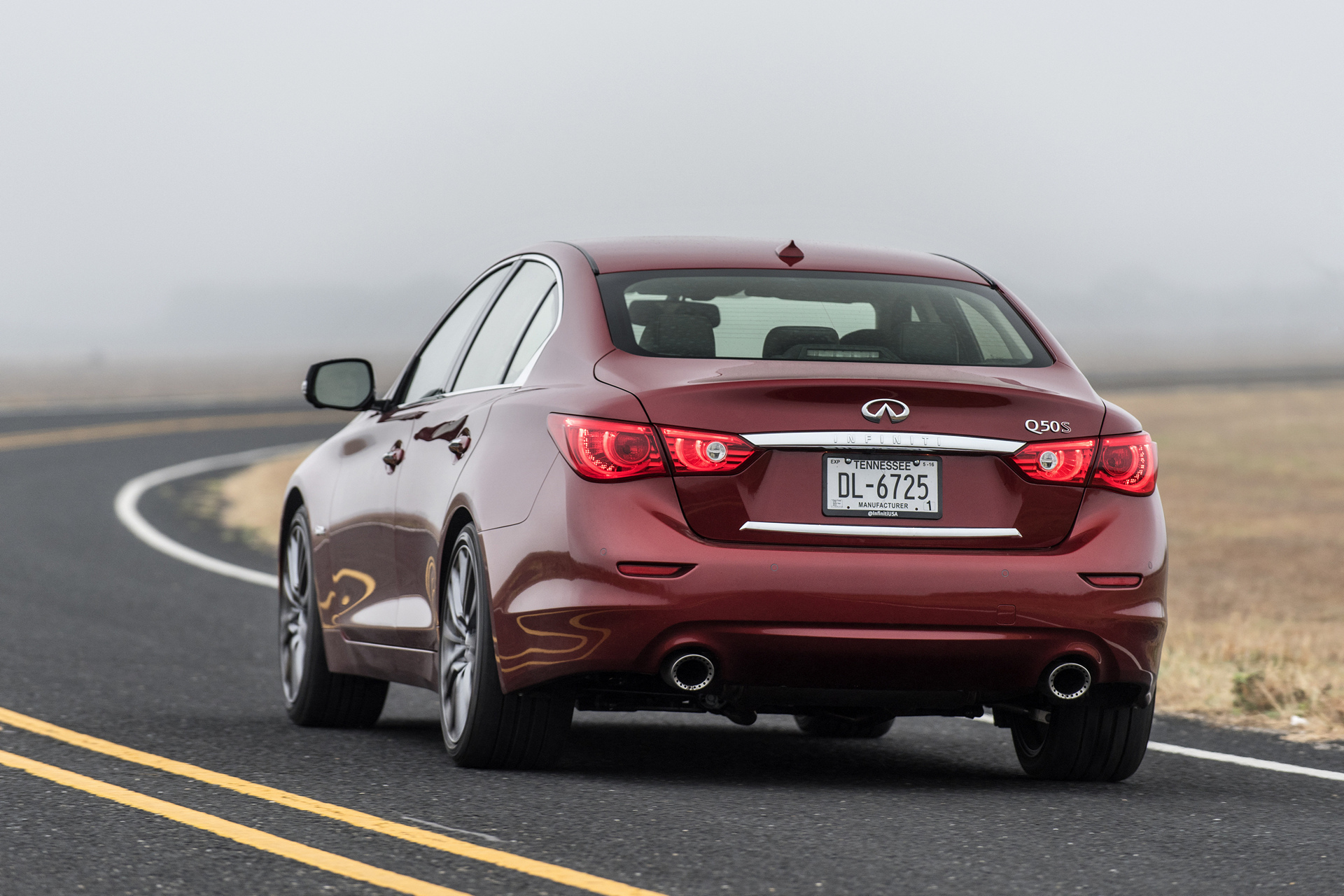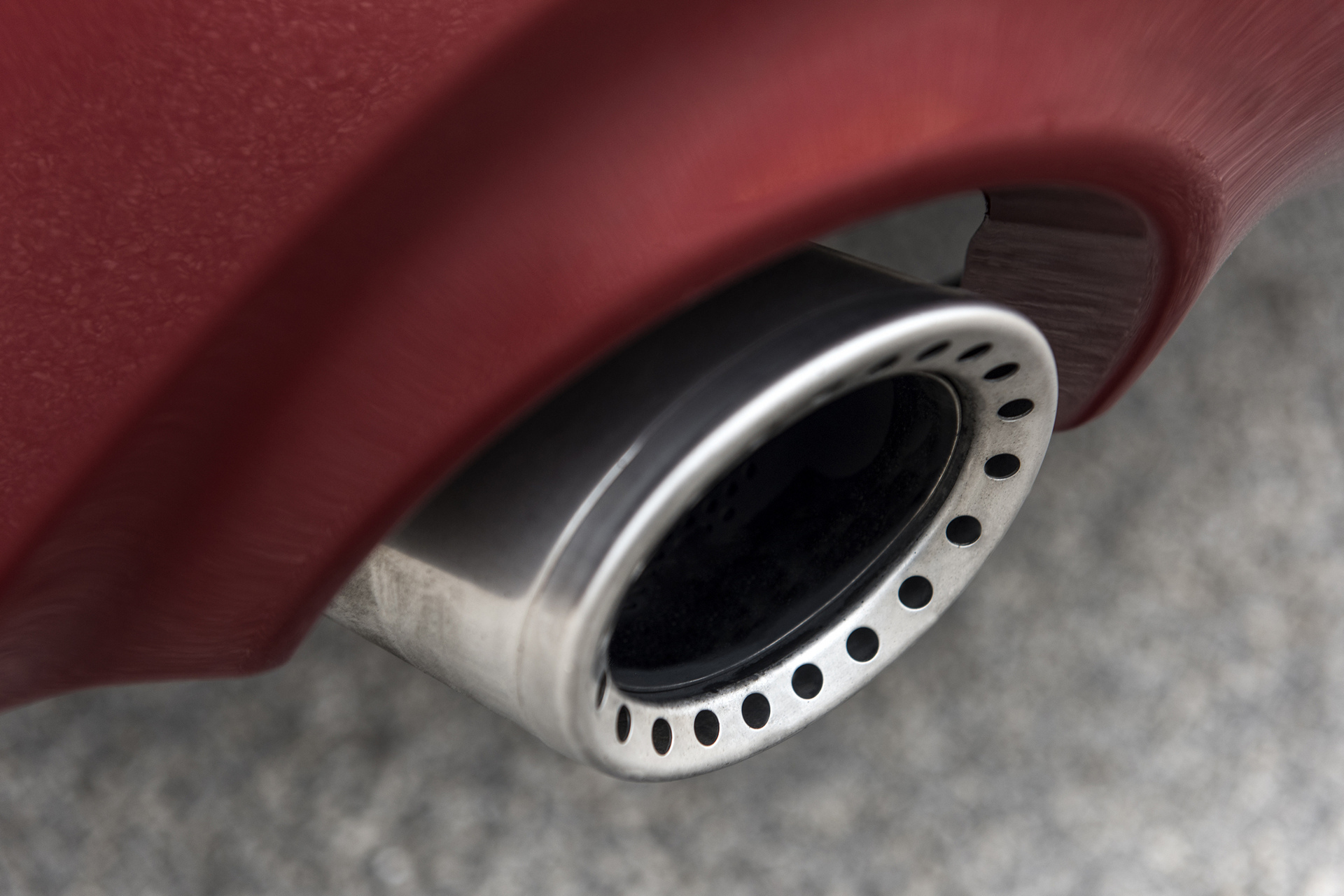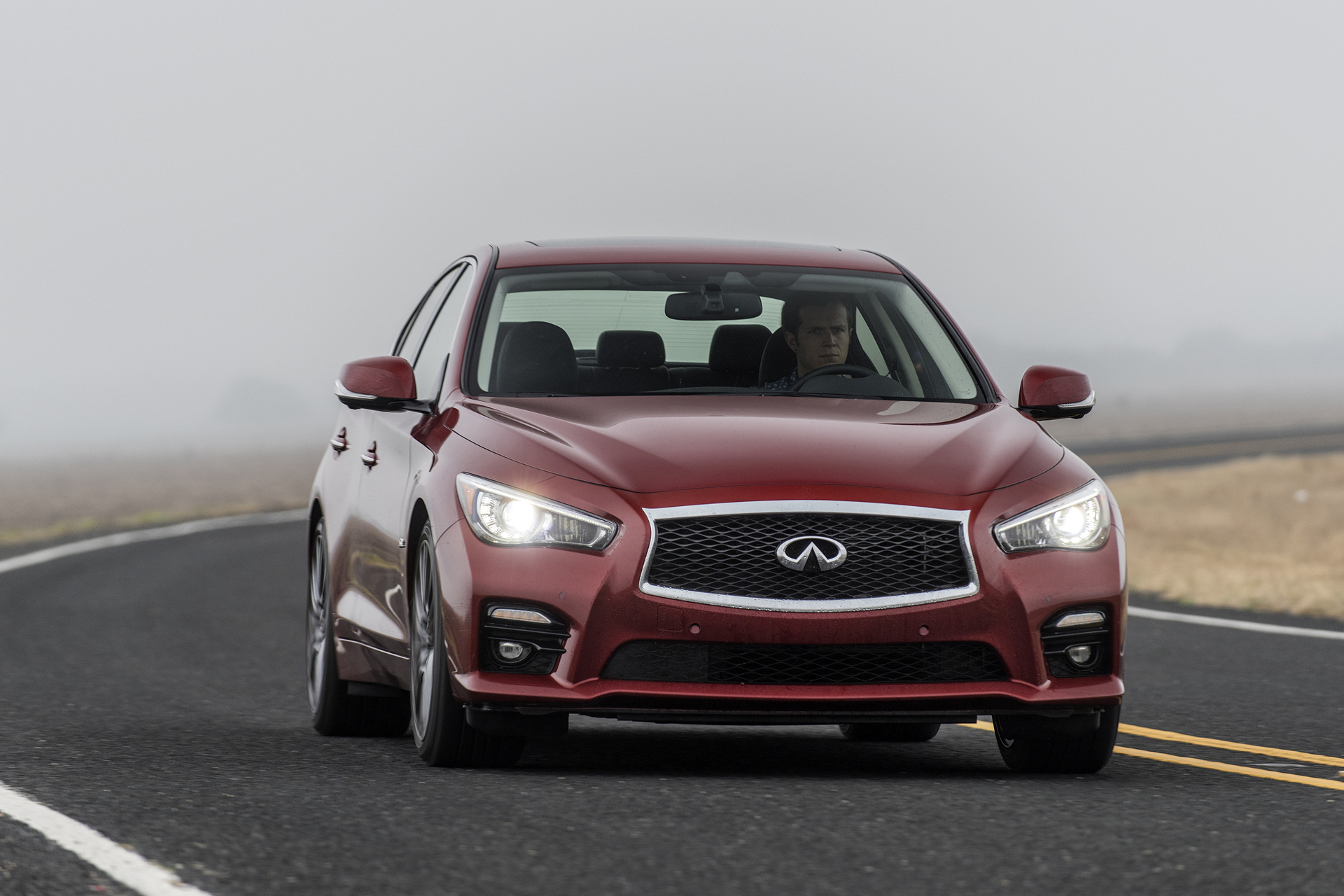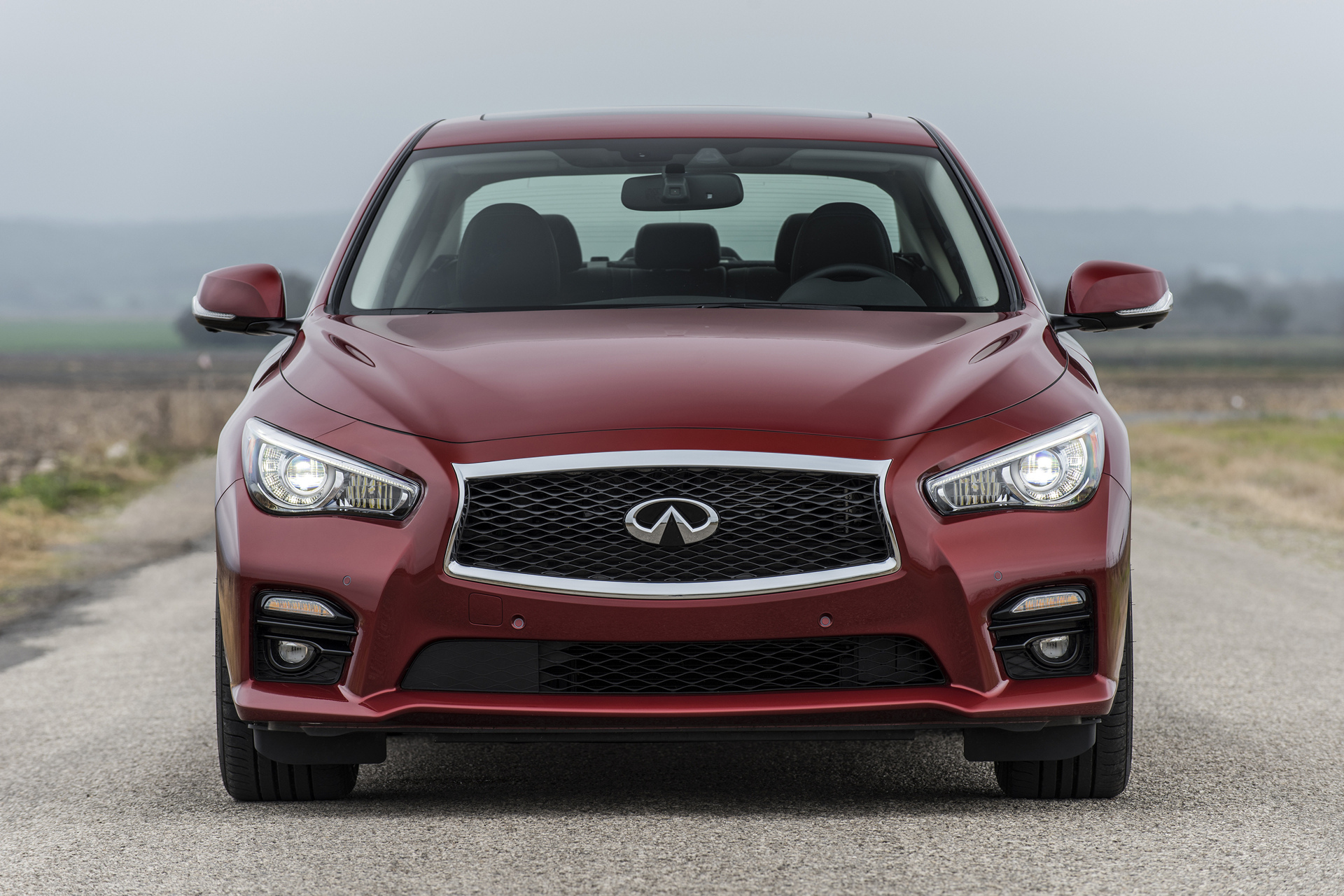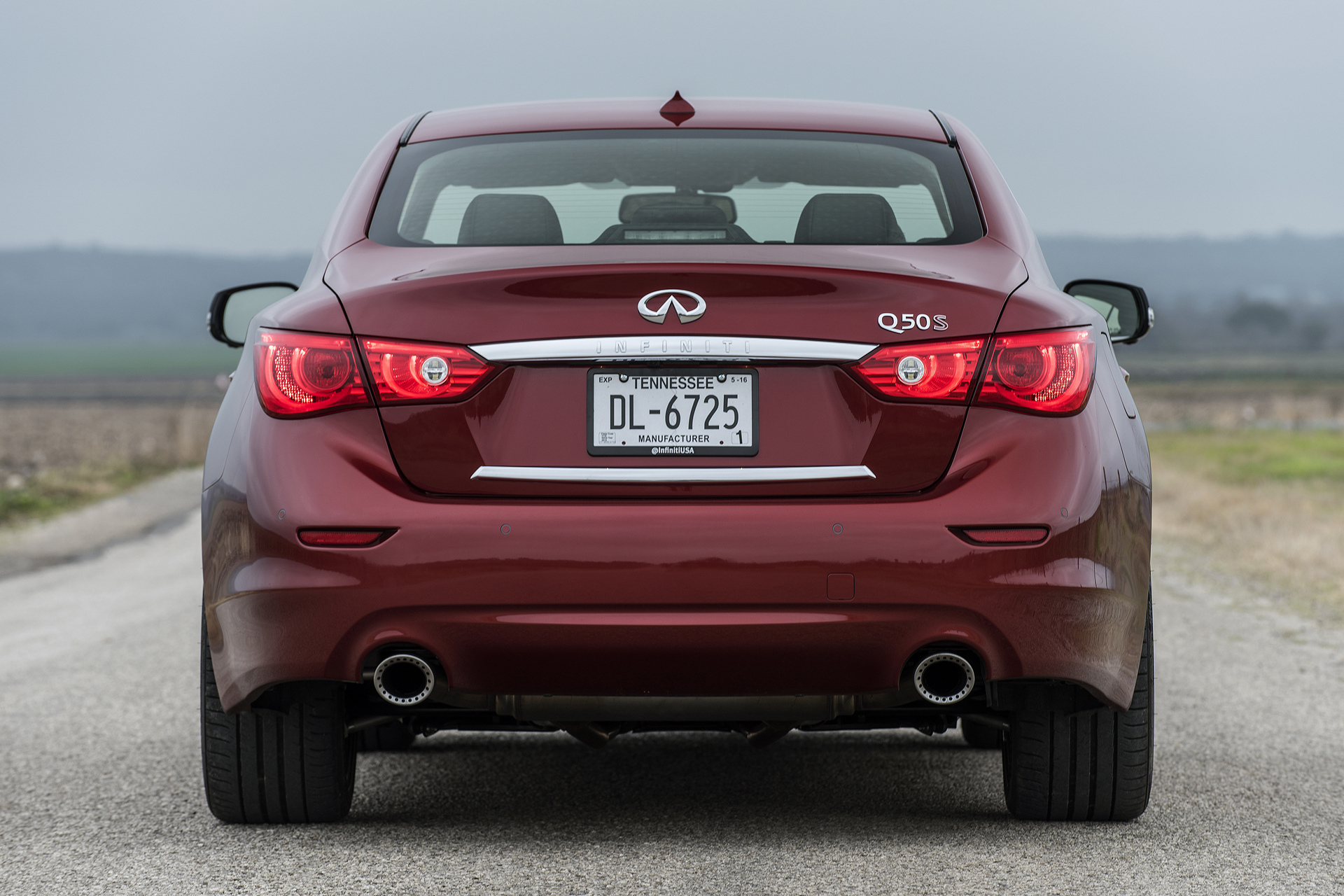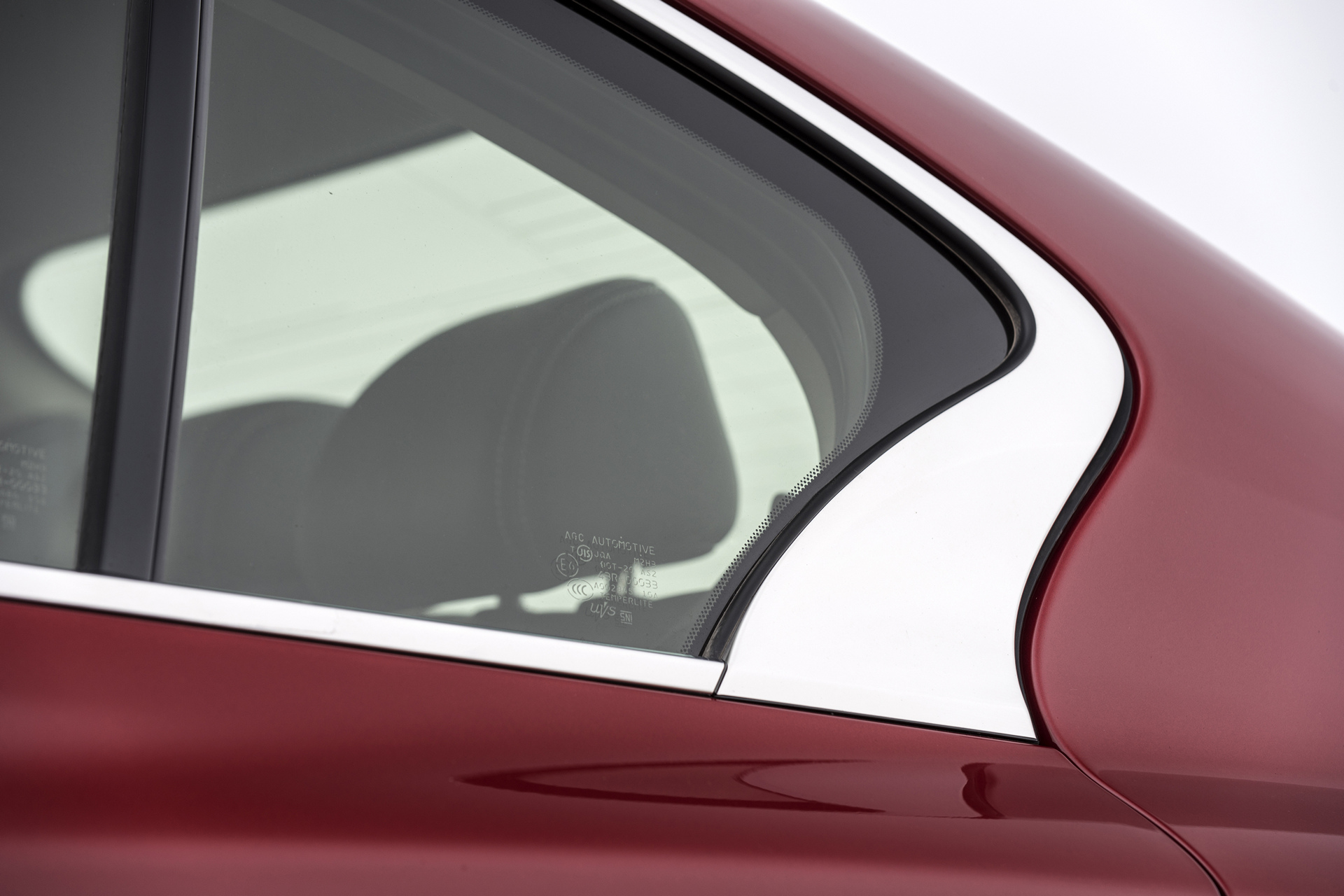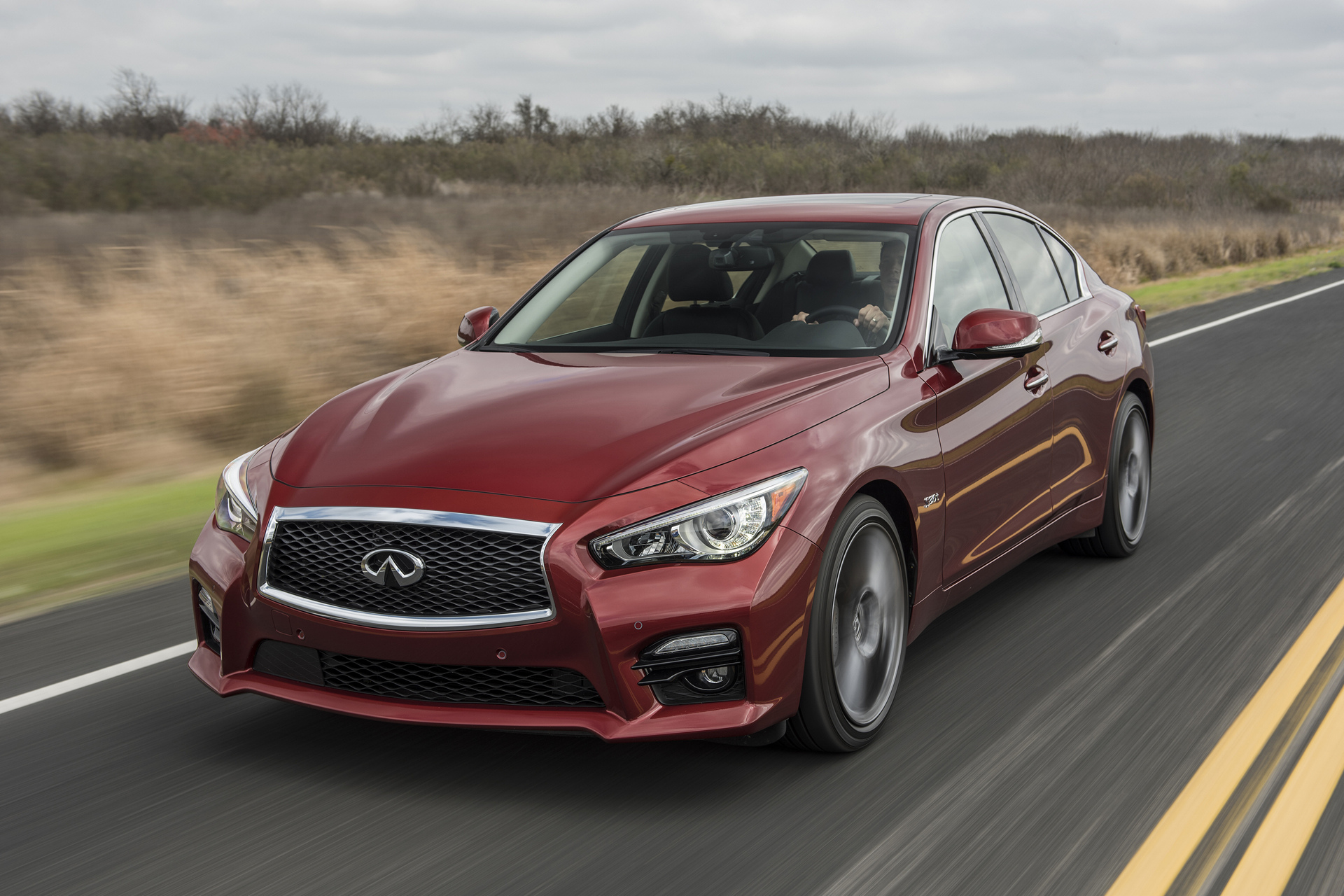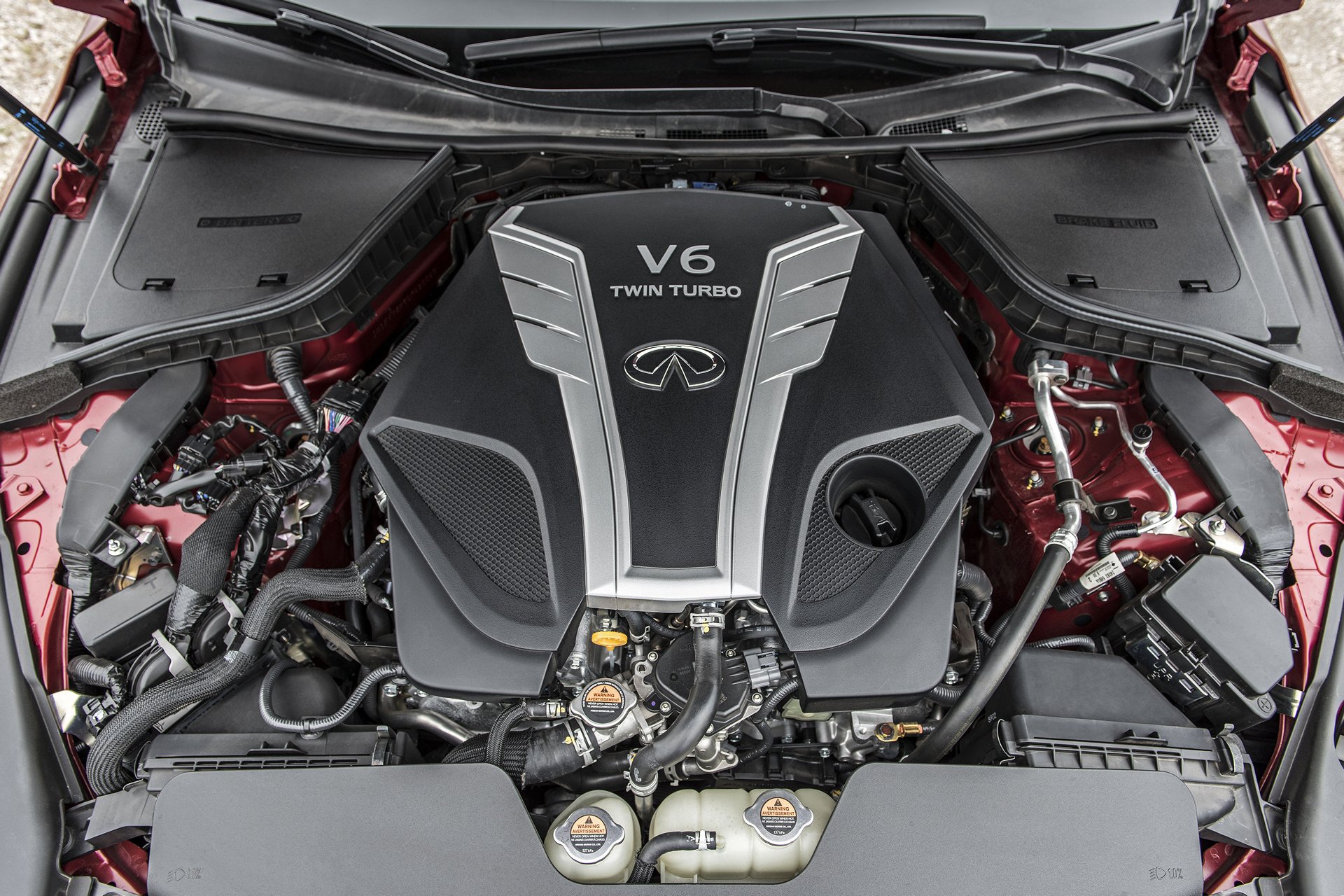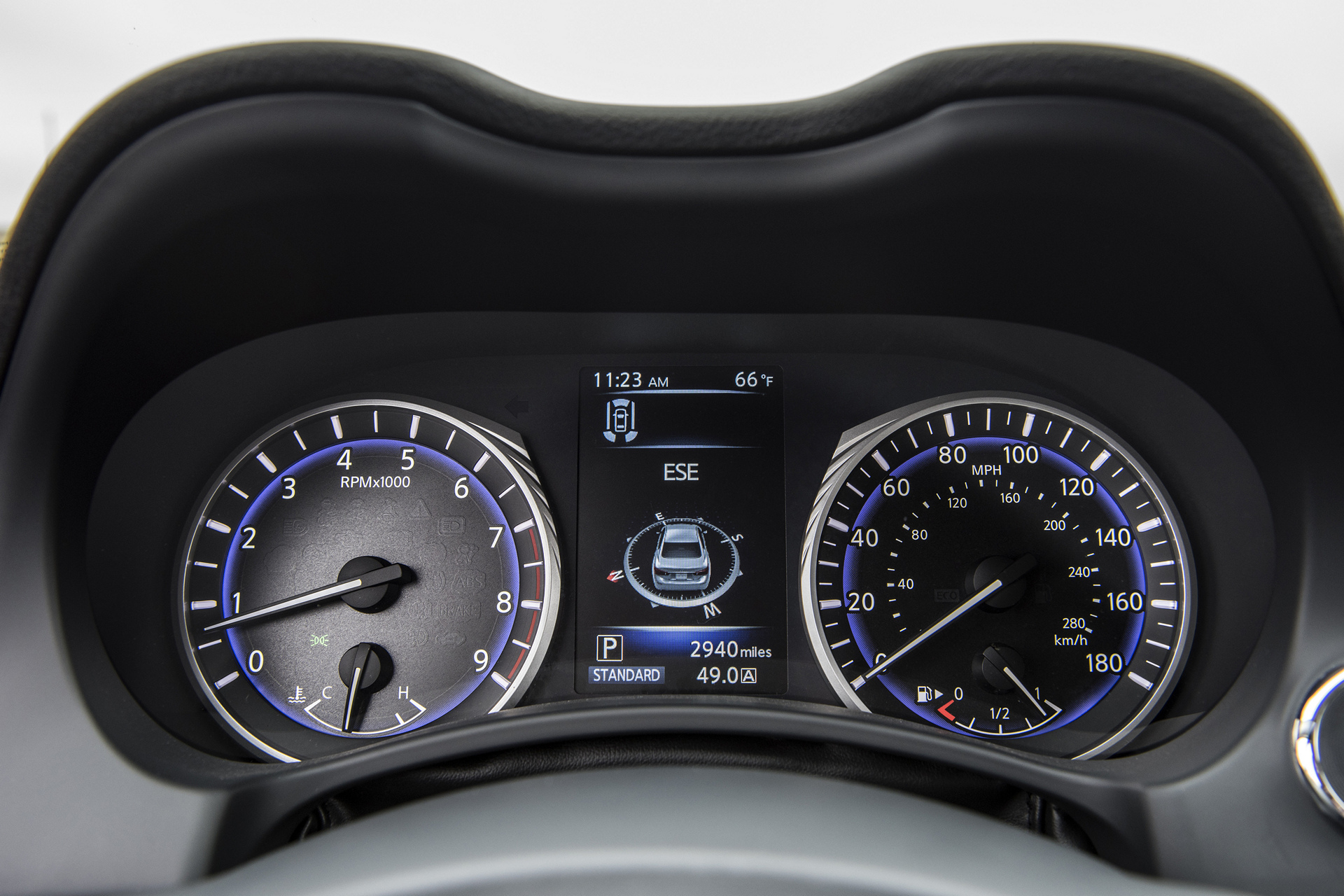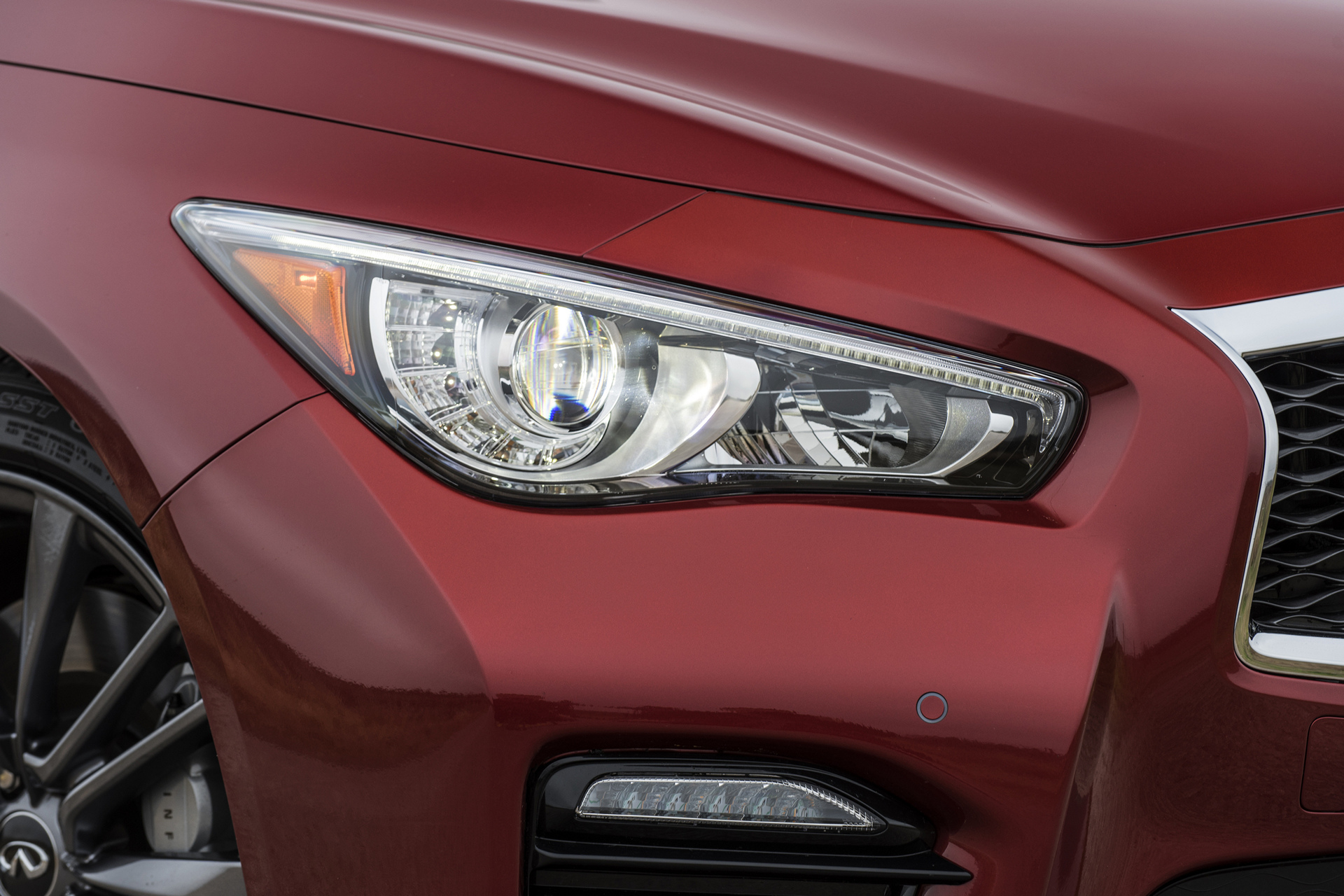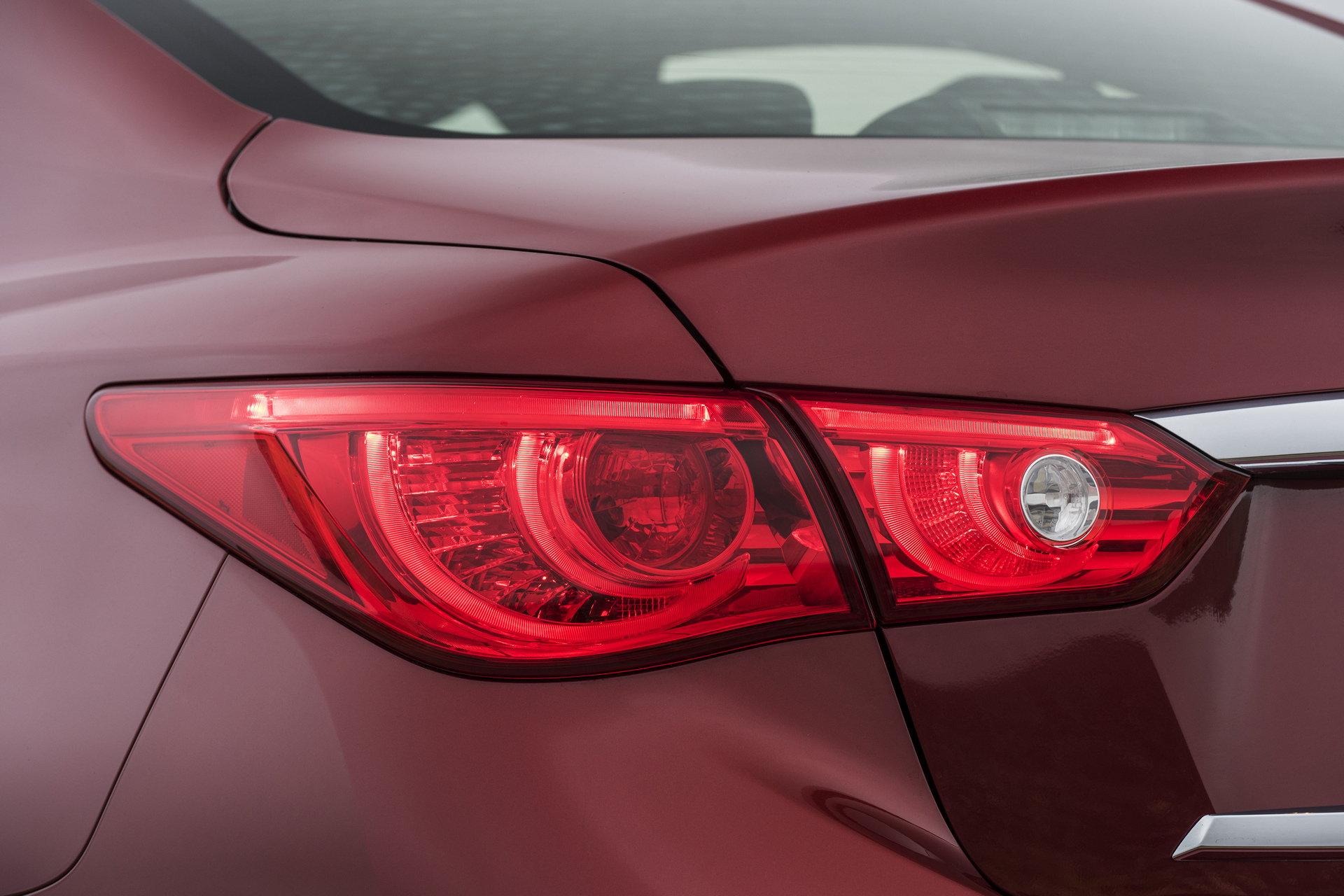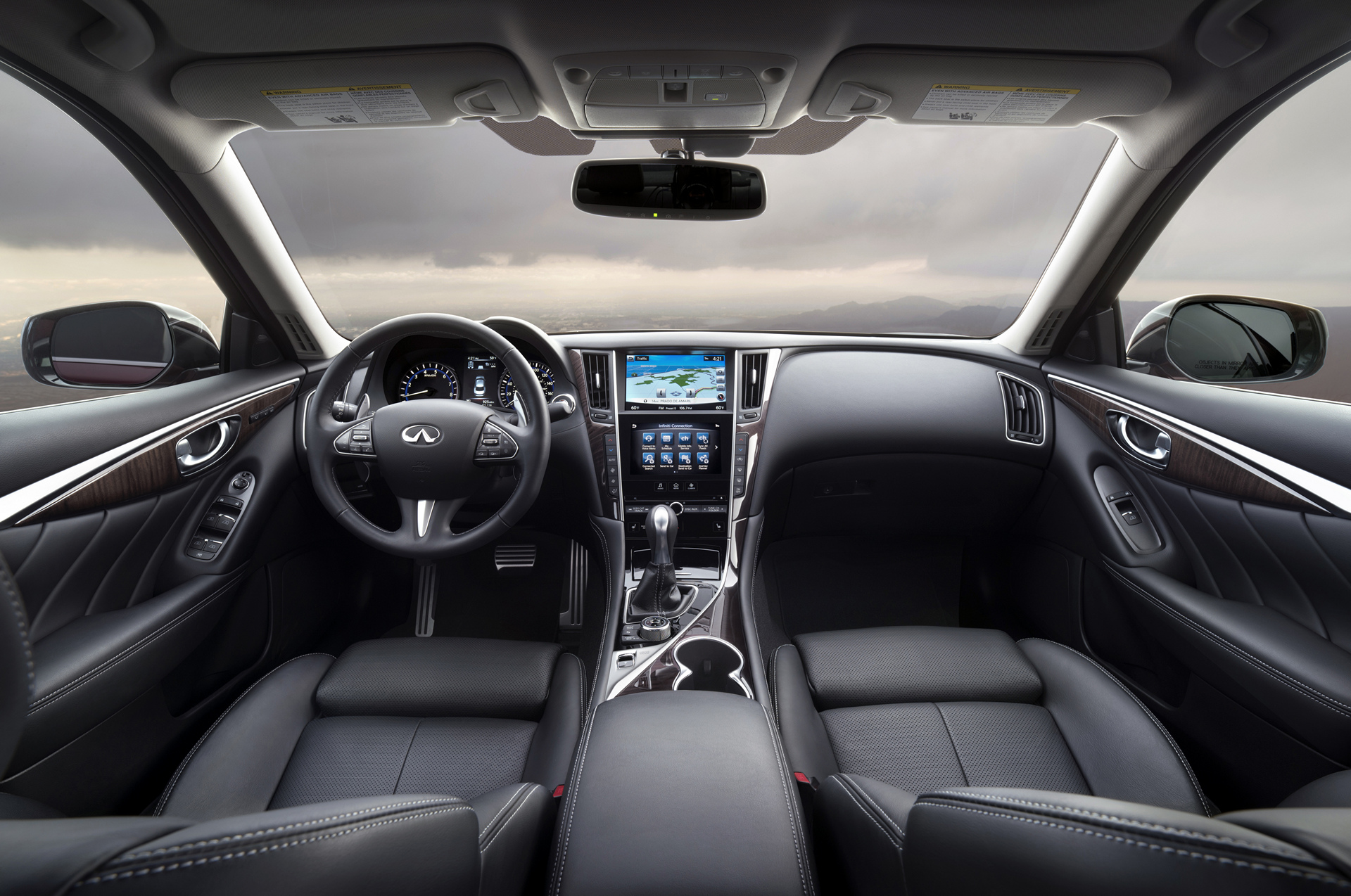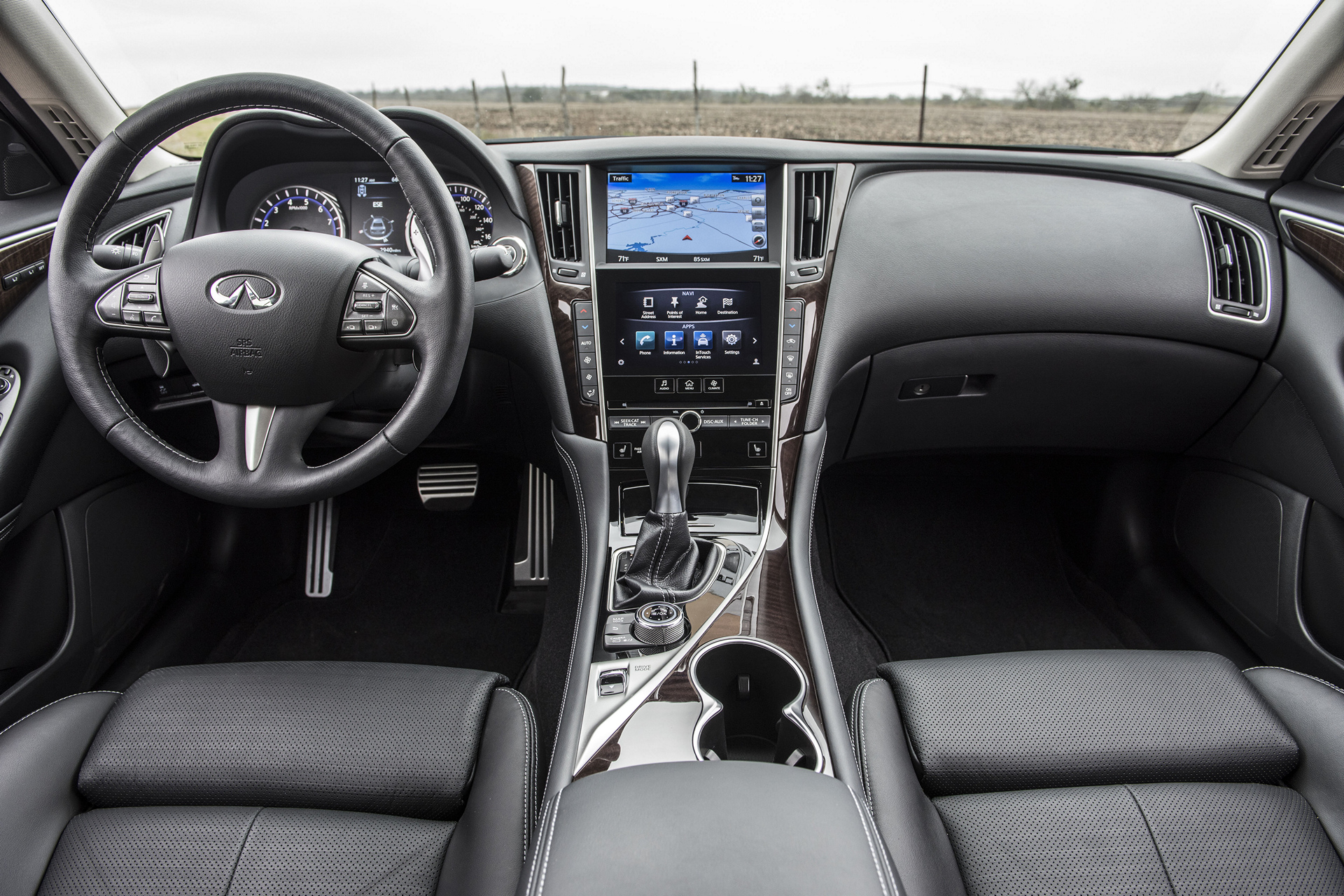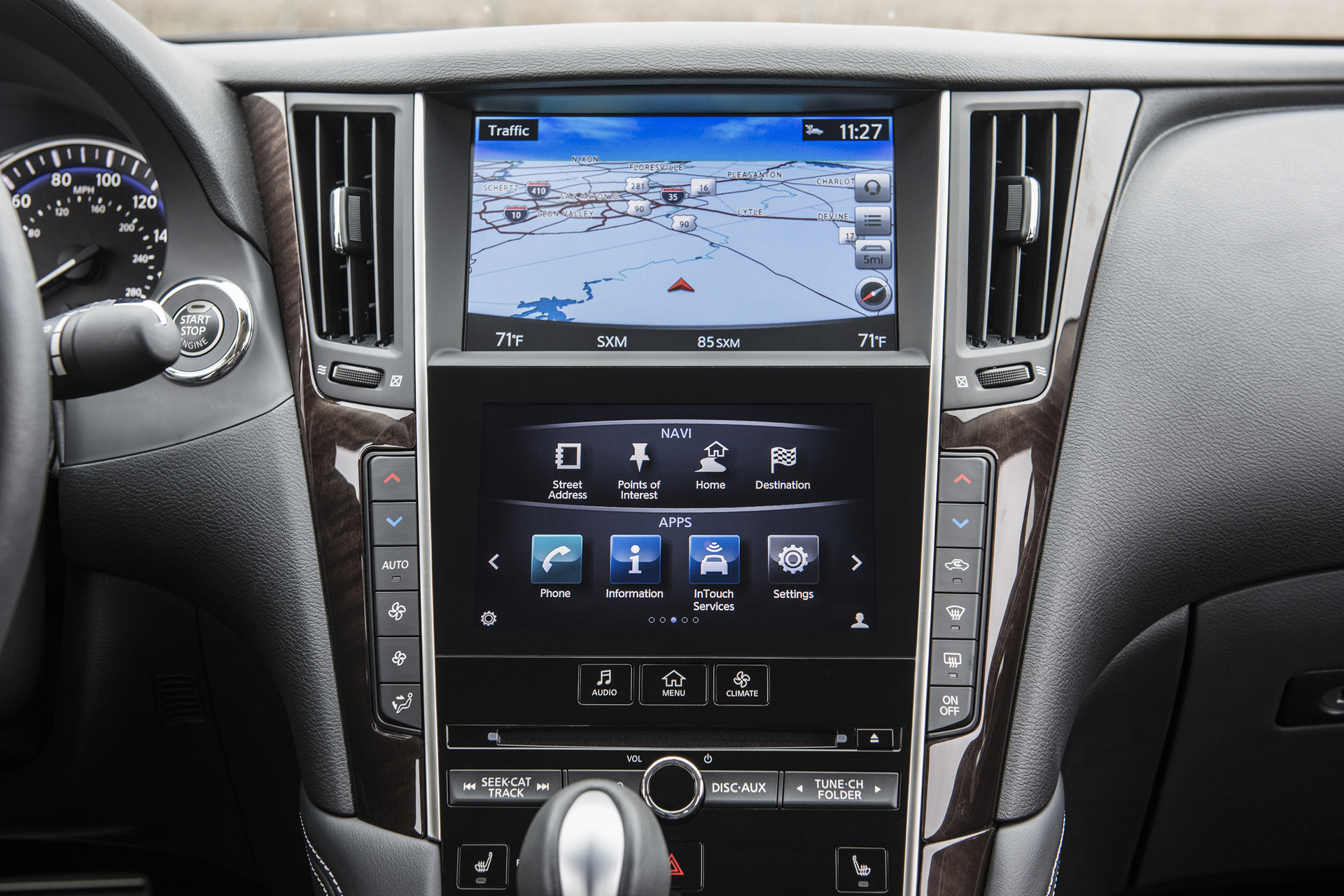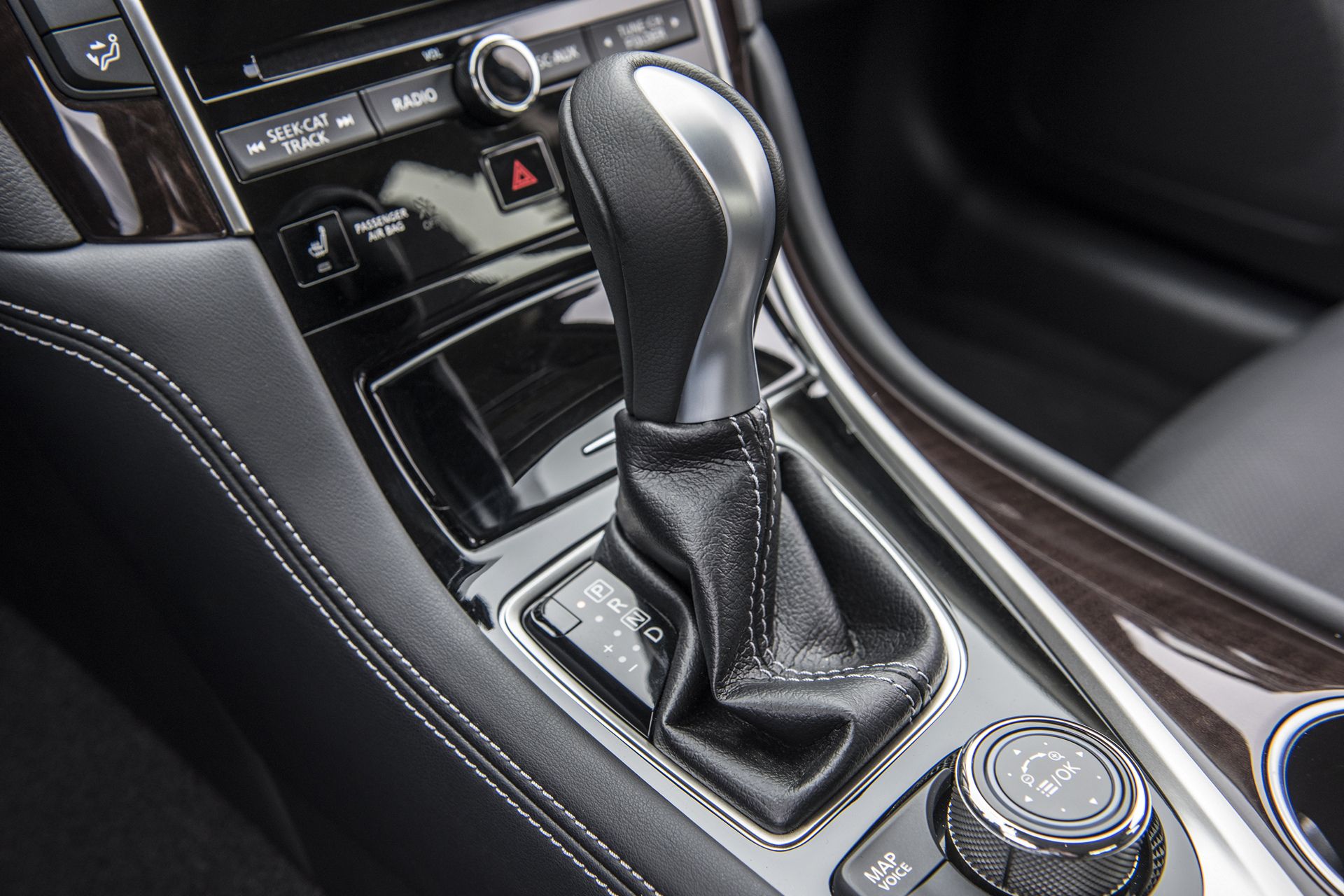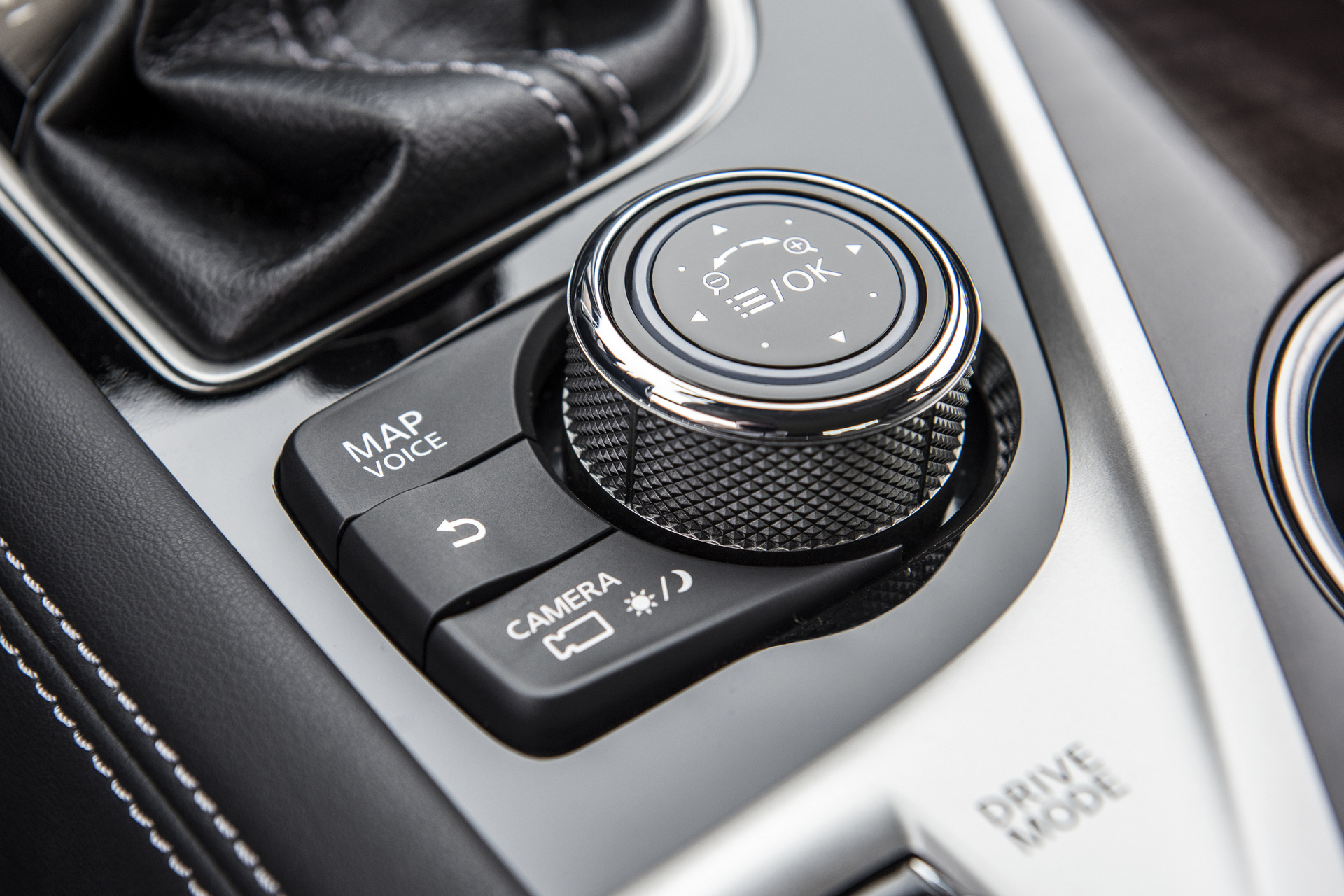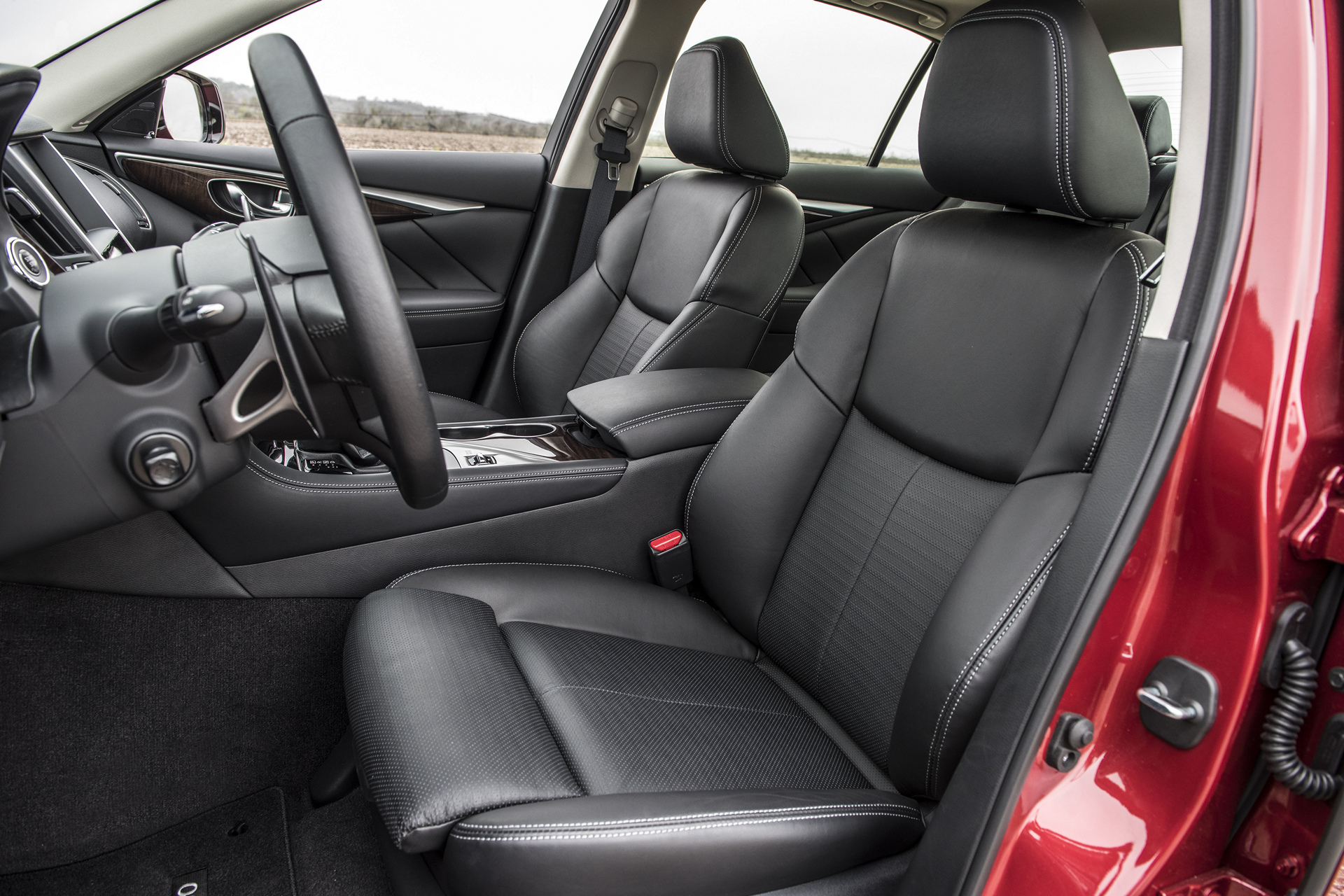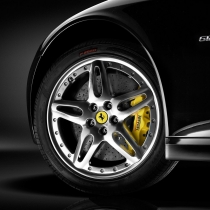2016 Infiniti Q50 Sports Sedan Offers Trio of New Turbocharged Engines, Along with Enhanced Chassis Technologies, to Deliver a More Rewarding Driving Experience
When the Infiniti Q50 sports sedan was introduced for the 2014 model year, it was big news – both for its seductive styling and its suite of exclusive technologies such as its world’s first Direct Adaptive Steering™, Active Lane Control and Predictive Forward Collision Warning. Now, just two years later, the Q50 is posed to shake up the status quo in the segment once again with an extensive list of enhancements – starting with three new turbocharged engines and a range of new chassis technologies.
“As Infiniti’s best-selling nameplate in the United States and around the globe, it’s critical that we keep moving forward with state-of-the-art performance and safety technologies,” said Randy Parker, vice president, Infiniti Americas. “For 2016, we’re dramatically expanding our Q50 model range with the 400-horsepower Red Sport 400 on one end and the new 2.0t, featuring our first 4-cylinder engine in the segment, at the other. This allows us our customers to find the perfect match for any driving style or need.”
The 2016 Infiniti Q50 is now offered in a range of trim levels, each in a choice of rear-wheel or all-wheel drive – Q50 2.0t and Q50 2.0t Premium, Q50 3.0t Premium, Q50 Hybrid Premium, Q50 3.0t Sport and Q50 Red Sport 400.
Responsive performance – served four ways
While the stunning appearance of the 2016 Q50 is virtually unchanged, there are bold new engine selections waiting behind the signature Infiniti double-arch grille and wide hood. The advanced 3.5-liter V6 gasoline-electric hybrid is the only powertrain carried over from the previous year.
Leading the trio of new powerplants is the new, exclusive “VR-series” 3.0-liter V6 twin-turbo engine. It is available in two states of tune – 400 horsepower or 300 horsepower – and is a more than worthy successor to the renowned, highly awarded “VQ-series” V6 that has been a mainstay of Infiniti performance models for many years. Both of the new VR-series engines have been developed to provide an ideal mix of drivability, efficiency and performance. Around 85 percent of the parts utilized in the VR-series V6 are different from those used in the previous VQ-series V6.
While the all-new power unit is 19 percent smaller in capacity than the Q50’s previous 3.7-liter V6, it adopts a series of innovative technologies to deliver a more engaging driving experience. Chief among these is a new direct-injection gasoline (DIG) fueling system. The high-pressure DIG system allows for more precise injection of fuel into the combustion chamber, delivering the exact amount required for smooth engine acceleration, depending on throttle position and engine speed. This system makes the new V6 the cleanest and most fuel-efficient engine of its type that Infiniti has ever offered, contributing towards the 6.7 percent improvement in fuel economy.
The engine also features lightweight aluminum construction and low mechanical friction – providing smooth, durable and highly responsive performance. Chief among the engine’s weight-saving elements is the adoption of spray bore coating for the engine block and integrated exhaust manifold for cylinder heads. Not only does this make the engine lighter, but this also aids cooling as heat can dissipate more effectively.
One of the many other significant features is the adoption of a new integrated exhaust manifold, built into the cylinder head, which positions the catalytic converter closer to the exhaust point. This results in a shorter flow path for the hot exhaust gases, allowing the catalytic converter to heat up almost instantly – twice as fast as previous V6 engines – improving response, while also reducing emissions from a cold start. Moving the catalytic converter closer to the exhaust point also saves weight by making the engine more compact than before.
The VR-series’ power delivery is enhanced through an advanced new twin-turbo system, which enables smooth and immediate responses under acceleration, while aiding efficiency. An optimized turbine blade design helps the engine generate greater overall performance, with faster turbine revolution speeds allowing for an immediate response from the twin-turbo system.
In addition, the engine features a new turbine speed sensor, which allows for the twin-turbo system to perform at up to 220,000 rpm – at steady condition and 240,000 rpm at transient condition – higher than ever before for a V6 power unit. With greater capacity for faster revolutions, the twin turbochargers boost the higher-powered version of the engine to deliver higher power and torque. A turbo speed sensor on the 400 horsepower version allows for up to 30 percent more power output. Boost pressure is 14.7 psi, versus 9.5 psi for the 300-horsepower version.
The engine also features a water-cooled intercooler system to further improve performance and efficiency. The system rapidly cools air as it enters the twin-turbo system, reducing turbo lag and allowing for more immediate acceleration. The secondary result is a cooling system that is more compact – meaning a shorter flow path for air entering the turbocharger to enable quicker engine response. A new electronic wastegate actuator allows closer control of exhaust gas flow away from the turbocharger, restricting the amount of exhaust gas flowing through the unit to improve overall engine efficiency.
The high-output version, which is standard in the range-topping and aptly named Q50 Red Sport 400, delivers 400 horsepower at 6,400 rpm, the most standard horsepower in class for a non-specialty model. Torque is rated at 350 lb-ft at 1,600-5,200 rpm.
The standard output version, offered in the Q50 3.0t Premium and Q50 3.0t Sport models, produces 300 horsepower at 6,400 rpm and 295 lb-ft (torque at 1,600-5,200 rpm.
Complementing the new 3.0-liter V6 is a 2.0-liter four-cylinder turbocharged unit, rated at 208 horsepower at 5,500 rpm, with peak torque of 258 lb-ft available from 1,500 rpm. This engine, like the 3.0-liter V6, has been engineered to blend responsive performance with enhanced fuel efficiency.
The 2.0-liter engine features a lightweight aluminum block and cylinder head with chain-driven dual-overhead camshafts, die-cast aluminum cylinder crankcase and optimized crank assembly promote further weight savings, reduce friction and improve efficiency. For the first time, the Q50 will offer an idle stop-start system (ISS) in combination with the 2.0- liter turbocharged engine. The engine was developed in conjunction with Daimler and is assembled at Infiniti’s engine facility in Decherd, Tennessee.
The fourth available Q50 powerplant is the advanced gasoline-electric hybrid, which remains unchanged from the previous year. It features Infiniti’s proven Direct Response Hybrid® system with Intelligent Dual Clutch Control. It combines a 3.5-liter 24-valve DOHC aluminum-alloy V6 and a compact laminated lithium-ion battery with an innovative one-motor, two-clutch control. The system’s V6 is rated at 302 horsepower and 258 lb-ft of torque, while the advanced 50 kW electric motor is rated at 67 horsepower and 214 lb-ft of torque. The hybrid system net power is 360 horsepower, providing strong acceleration and lean fuel economy.
The hybrid powertrain is designed to put performance first, while bringing significant benefits for fuel efficiency. It takes full advantage of the electric motor’s instant torque for exceptional acceleration and, in combination with the 3.5-liter V6, provides an energetic feel under all driving conditions.
All 2016 Q50 powertrains are matched to an advanced seven-speed electronically controlled automatic transmission with manual shift mode and available steering column-mounted magnesium paddle shifters on Sport models. The gearbox features improved logic and hardware to handle the power output of the new VR-series engines. Dual transmission coolers are utilized to better diffuse heat.
In addition, the Q50’s Adaptive Shift Control enhances gear selection by using a lateral acceleration sensor to detect changes in the road, such as hills and turns. Sport Mode allows the driver to select a more aggressive shift pattern with automatic up- and down-shifting at higher rpm. The Sport Mode allows a more aggressive shift pattern and higher rpm downshifting. Manual Mode is also standard, with genuine magnesium paddle shifters added with Q50 3.0t Sport and Red Sport 400 grades. The combined effect is for any driver to enjoy quick, smooth shifts and gear choices that are appropriate to both the road and the desired driving style.
The 2016 Q50 can be configured with one of two driveline options – rear-wheel drive or Intelligent All-Wheel Drive. Both are available with any of the four engines.
Next-gen Direct Adaptive Steering and new Dynamic Digital Suspension
Also making its debut on the 2016 Infiniti Q50 is the second generation of Infiniti’s industry leading Direct Adaptive Steering (DAS), comprehensively modified from the groundbreaking first-generation system. Infiniti has enhanced the Direct Adaptive Steering after gathering customer feedback from around the world and completing 625,000 miles of real-world testing.
The DAS’s standard steering mode now offers advanced levels of steering feel and feedback – more akin to that of a conventional steering system. In addition, the upgraded system offers even more options to personalize and tailor the steering system’s levels of response and feel to suit the driver’s preferences.
For the new second-generation, engineers have optimized the control logic to improve feedback from the road – fine-tuning parameters so that the default setting better mimics the feeling drivers are used to from conventional systems.
The new system also provides more customization options, fully utilizing the potential that DAS offers, giving drivers’ flexibility to choose the level of steering assistance and feedback according to personal preferences. It actively adjusts the steering ratio and effort according to vehicle speed and scene. In slow-moving situations, such as city driving or parking, the system is tuned for ease of maneuverability. In order to further enhance the steering feel in sporty driving conditions, the steering effort gradually saturates with high lateral G-force and acceleration in line with the overall vehicle behavior.
Direct Adaptive Steering is able to transmit the driver’s input to the wheels faster than a mechanical system while requiring fewer steering corrections and is able to make 1,000 steering adjustments per second. The new system enhances the steering feel by quickly and intelligently communicating to the driver feedback about road surface and chassis behavior. This gives the driver a secure and confident feeling at the wheel, free from unnecessary steering kickbacks or vibrations. The elimination of unwanted feedback has the further benefit of reducing driver fatigue.
The expanded selection of steering modes within DAS is accessed through the Drive Mode Selector (DMS). Located via menus displayed in the center console, Drive Mode Selector allows the steering response to be selected from six available options: Personal, Standard, Snow, Eco, Sport, and – new for the 2016 Q50 model – Sport+.
The new version of Direct Adaptive Steering works with Active Lane Control to maintain lane positioning against crosswinds and uneven road surfaces. This semi-autonomous capability is a precursor to future steering systems that will form a key building block on the way to achieving fully autonomous driving.
Standard on Q50 models equipped with the new 3.0-liter V6 twin-turbo engine is Infiniti’s new Rack Electronic Power Steering. This system provides a linear and in-control driving experience that can be tuned through the Drive Mode Selector. When making a steering input or returning the steering wheel following an input, traditional steering systems can create an unnatural feeling through imprecise control of the power assistance, reducing the feeling of linearity. To counter this, Infiniti’s Rack Electronic Power Steering precisely increases the steering effort required as the vehicle’s yaw rate changes, before adjusting to provide more assistance when the wheel returns towards on-center.
Infiniti Q50 2.0-liter-equipped models feature a standard speed-sensitive hydraulic electronic rack-and-pinion power steering system. This system increases assistance at low speeds and reduces assistance for enhanced feel and response at higher speeds.
The 2016 Q50 also features Infiniti’s new Dynamic Digital Suspension (DDS). Standard on Q50 3.0t Sport and Red Sport 400 grades, it provides an optimal blend of ride comfort and class-leading response and agility. The shift from a comfort-biased ride to enhanced dynamic response can be made when the driver places the electronically adjustable shock absorbers in either Sport or Sport+ modes (adjusted via the Drive Mode Selector), providing firmer damping control for more agile handling. While in these modes, the suspension is constantly adjusting to provide ideal performance and a flat ride.
In all modes, Dynamic Digital Suspension (DDS) also constantly adjusts the shock absorber valve within a wide range of damping force to control body motion when cornering. It monitors body roll, pitch and bounce rate to restrain body motion for a comfortable, confident and insulated ride in all conditions, ensuring that bumps and undulating road conditions are absorbed to maintain flat body posture.
Every Q50 features a 4-wheel independent suspension. For 2016, revised suspension settings provide an improved balance between confident handling and a comfortable ride. The front suspension is a double-wishbone design, while the revised rear suspension utilizes a multi-link design with coil springs and Dual Flow Path® shock absorbers (non-Sport models). Extensive use of aluminum components for the suspension keeps weight down. The Q50 now benefits from revised front and rear stabilizer bars. The result is heightening resistance to unwanted adjustments in the lateral movement of the suspension, affording a flatter ride and greater agility during cornering. The revised system is also better able to maintain contact between the tires and road.
A range of wheel and tire combinations are available, starting with the Q50 2.0t and 3.0t Premium models’ 17-inch machine-finished aluminum-alloy wheels with 225/55R17 all-season run-flat tires. The Q50 3.0t Sport and Q50 Hybrid Premium models offer 19-inch aluminum-alloy wheels and run-flat tires. The Q50 Red Sport 400 features unique staggered 19-inch aluminum-alloy wheels and 245/40R19 front / 265/35R19 rear summer performance run-flat tires.
Daring, expressive design – inside and out
The 2016 Infiniti Q50’s strong first impression is created by its combination of stylish, purposeful proportions and aggressive stance – which provides a powerful statement of the sports performance awaiting the driver.
Signature Infiniti exterior design features include the powerful double arch grille, dynamic arch roofline and Crescent-cut C-pillar. The front end design is decidedly aggressive, with a sport front fascia offered on the Q50 3.0t Sport and Red Sport 400 models. The grille’s three-dimensional, textural quality is provided by elaborate detailing of the waved mesh pattern surface and chrome surround, while the distinctive LED headlights and LED daytime running lights suggest an expressive form, almost like the human eye.
The lean, robust body sides are designed to anchor the performance stance with a strong, solid “bone” and arched roofline that flows to the Crescent C-pillars. In the rear, the side character lines smoothly merge with the shape of the rear LED combination lights. The familiar rear double-arch trunk line completes the strong, unforgettable view from behind. Heated outside mirrors with integrated LED turn signals are standard, while an available power sliding and tilting glass moonroof is offered on all models. The Q50 Red Sport 400 includes red “S” badging and unique exhaust tips, helping assert the car’s performance credentials and adding to its aggressive, confident aura.
Other exterior refinements include wide door architecture with narrower, roll-formed A- and B-pillar sashes that provide improved ingress and egress, as well as a more open cabin environment. The body design also offers enhanced airflow over both the upper and lower body portions, resulting in a coefficient of drag as low as 0.26 (varies by grade level and drive configuration). The Q50 also features zero front and rear lift.
The color palette has been specially selected to accent the Q50 contours and sculpted surfaces and includes a range of nine premium colors: Chestnut Bronze, Malbec Black, Liquid Platinum, Graphite Shadow, Black Obsidian, Venetian Ruby, Majestic White, Hagane Blue and new-for-2016 Iridium Blue.
Matching the inspired Infiniti Q50 design and performance is an interior created to the same extraordinary standards. The interior environment offers a powerful blend of three-dimensional textures, highest craftsmanship and premium quality, combining modern luxury and user-focused advanced technology.
The Q50 interior is also created as an invitation to drive – to celebrate the elation of driving that is often lost in the modern world. As such, special attention was paid to the driver position, offering a generous range of customizable adjustments within a cosseting yet comfortable cockpit.
The Q50’s instrument panel honors Infiniti’s “double wave” design tradition, while updated with an asymmetrical flow from the top of the center cluster to the wide center console. Access to all key operations and controls is designed so that the driver does not need to change driving posture, including use of hard switches, touch panels, Infiniti Controller and Infiniti Drive Mode Selector.
The front and rear seats help distribute body pressure across a wider range of the upper seating surface. The roomy interior space offers ample front and rear headroom, ample rear knee room enhanced by the thin front seatback design, and greater front seat slide and lift adjustability. Effective luggage space is among the best in the segment at 13.5 cubic feet with the 2.0-liter 4-cylinder and 3.0-liter V6s and 9.4 cubic feet with the hybrid powertrain.
The Infiniti Q50 features a choice of interior fabrics and colors, including available leather-appointed seating surfaces. Three interior colors are offered: Wheat, Graphite and Stone.
Finishing off the elegant interior is a combination of “Kacchu” aluminum inspired by traditional Samurai armaments and genuine maple wood trim, which is representative of the 16th century Urushi painting technique.
Premium audio systems include an available Infiniti Studio on Wheels® by Bose® audio system with an instrument panel 3-speaker array (14 speakers total throughout the cabin) and Advanced Staging Technology®. SiriusXM® Satellite Radio (SiriusXM® subscription required, sold separately) and High Definition (HD) radio are standard. Other features include Dual-Zone Automatic Temperature Control, Bluetooth® Hands-free Phone System, RearView Monitor and available Advanced Climate Control System (ACCS) with Plasmacluster® air purifier.
Building on Infiniti’s unique approach to making owners’ lives easier is the available Infiniti InTouch™ with Navigation and Infiniti InTouch™ Services, with lane guidance and 3D building graphics, voice recognition for navigation functions, including one-shot voice destination entry. Infiniti InTouch™ Services include six months of safety, security and convenience services, SiriusXM® Traffic, including real-time traffic information (SiriusXM® subscription required, sold separately).
Unlike conventional interfaces, the Q50 has not one but two touch capacitive screens with intuitive hand gesture screen operation to easily connect drivers to their lives outside the car. Along with the large dual screens (LCD/VGA 8-inch upper and 7-inch lower color displays), the Infiniti InTouch™ system is designed to effortlessly synchronize car and driver. Content and functions directed to the upper screen includes the most frequently used applications, such as navigation maps. Other content is directed to the lower display screen. The two screens work together so that, for example, the navigation map can be viewed on the top screen while setting destinations or finding points-of-interest can be done on the lower screen. A limited number of critical functions, such as heating and cooling, are operated by hard switches. Content can be customized using easy-to-understand menus.
The 2016 Infiniti Q50 builds on the long list of safety, security and driving aid technologies already found in other Infiniti models, maintaining the car’s class-leading position. Among the available systems are and Around View® Monitor with Moving Object Detection, Intelligent Cruise Control with Full Speed Range, Forward Emergency Braking, Distance Control Assist, Blind Spot Warning, Blind Spot Intervention®, Backup Collision Intervention®, Lane Departure Warning, Lane Departure Prevention with Active Lane Control™, Adaptive Front lighting System (AFS) and high beam assist technology.
The available world’s first Predictive Forward Collision Warning (PFCW) system can warn the driver of risks that lie beyond the driver’s field of view. It not only can sense the relative velocity and distance of a vehicle directly ahead, but also of a vehicle travelling in front of the preceding one and can help alert the driver to a potential forward collision.
A range of models and packages
The 2016 Q50 offers a wide range of available models and equipment packages. The Q50 2.0t’s long list of standard features includes 8-way power front seats, Dual-Zone Automatic Temperature Control, Infiniti InTouch™ and 17-inch aluminum-alloy wheels.
The Q50 3.0t Premium adds Auto Dimming Inside Mirror with HomeLink® Universal Transceiver, Infiniti Studio on Wheels by Bose® Premium Audio system with 14 speakers, along with Electronic Power Steering and more, while Q50 3.0t Sport models add a range of features such as sports front fascia, sport-tuned suspension with Dynamic Digital Suspension (DDS), sport brakes and sport-type leather-appointed seats.
The Q50 Red Sport 400 comes complete with staggered 19-inch wheels and tires, custom exhaust tips and, of course, 400 horsepower. Completing the Q50 lineup is the Q50 Hybrid Premium, with an array of standard comfort, convenience and safety technologies.
Key feature packages include the new Driver Assistance Package, which includes features such as Forward Emergency Braking (EB); Blind-Spot Warning (BSW); Back Collision Intervention (BCI) with Cross Traffic Alert (CTA); Predictive Forward Collision Warning (PFCW); and Around View® Monitor (AVM) with Moving Object Detection (MOD).
New for Q50 in 2016 is the feature-rich Premium Plus Package, available on all engine options and including: auto dimming exterior mirrors; electric memory exterior mirrors; electrically adjustable steering wheel with memory and easy entry functions; Infiniti InTouch™ with navigation and one year of InTouch services; navigation-synchronized adaptive shift control; SiriusXM® Traffic; voice recognition; 60/40 split-fold rear seat with center armrest; electric lumbar support and position memory for the driver’s seat; heated steering wheel and heated front seats. For 3.0-liter models, the Premium Plus Package also adds remote engine start.
The Technology Package has been revised for 2016 to include auto-leveling Adaptive Front Lighting System; High Beam Assist; Intelligent Cruise Control with full speed range; Distance Control Assist; Eco pedal; Advanced Climate Control System with Plasmacluster™ and Grape Polyphenol filter; as well as a range of safety features.
Pricing
| MODEL | SUGGESTED LIST PRICE (1) | ENGINE | TRANSMISSION |
|---|---|---|---|
| Q50 2.0t | $33,950 | 2.0L I4 Turbo | All models equipped with 7-spd auto w/manual shift mode |
| Q50 2.0t AWD | $35,950 | 2.0L I4 Turbo | |
| Q50 2.0t Premium | $37,650 | 2.0L I4 Turbo | |
| Q50 2.0t Premium AWD | $39,650 | 2.0L I4 Turbo | |
| Q50 3.0t Premium | $39,900 | 3.0L V6 Twin Turbo 300hp | |
| Q50 3.0t Premium AWD | $41,900 | 3.0L V6 Twin Turbo 300hp | |
| Q50 Sport | $43,900 | 3.0L V6 Twin Turbo 300hp | |
| Q50 Sport AWD | $45,900 | 3.0L V6 Twin Turbo 300hp | |
| Q50 Red Sport 400 | $47,950 | 3.0L V6 Twin Turbo 400hp | |
| Q50 Red Sport 400 AWD | $49,950 | 3.0L V6 Twin Turbo 400hp | |
| Q50 Hybrid Premium | $47,050 | 3.5L V6 Hybrid | |
| Q50 Hybrid Premium AWD | $49,050 | 3.5L V6 Hybrid |


